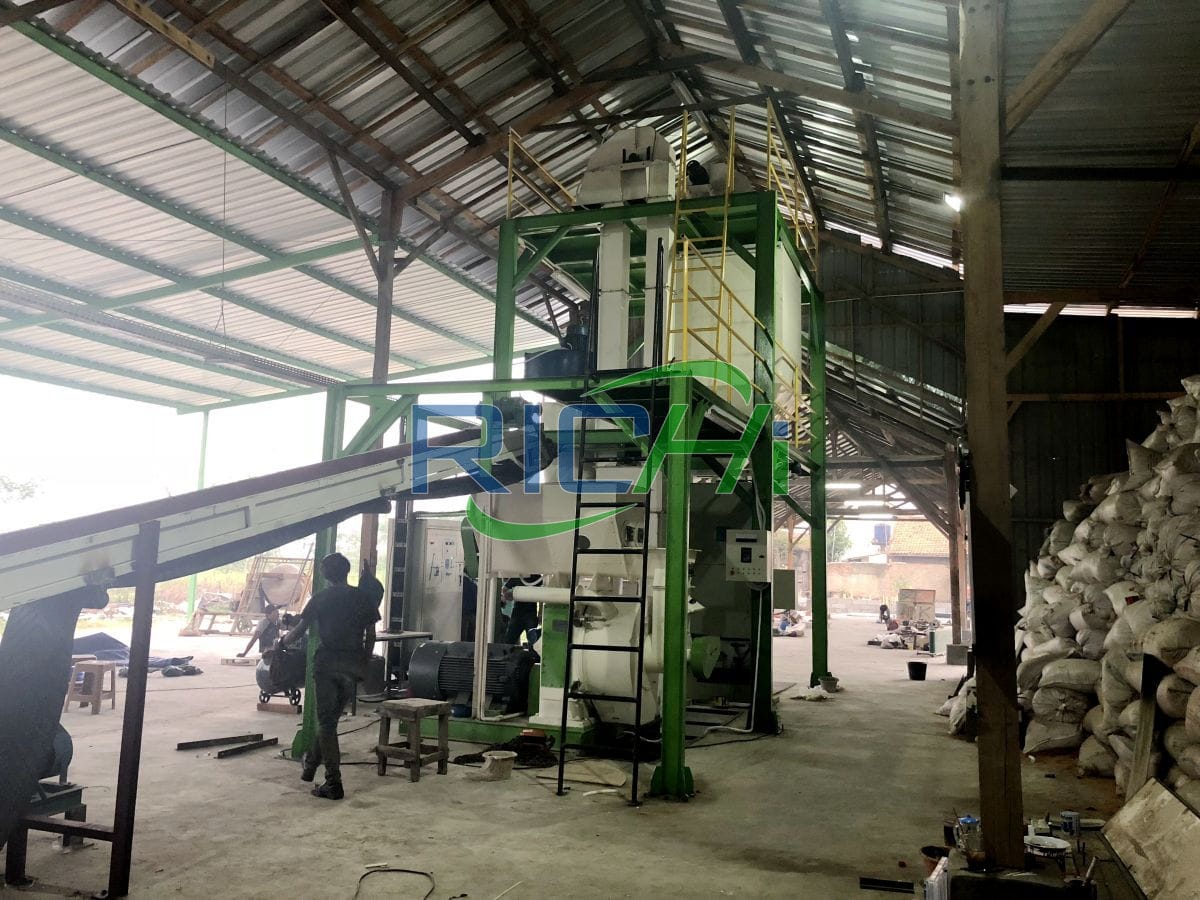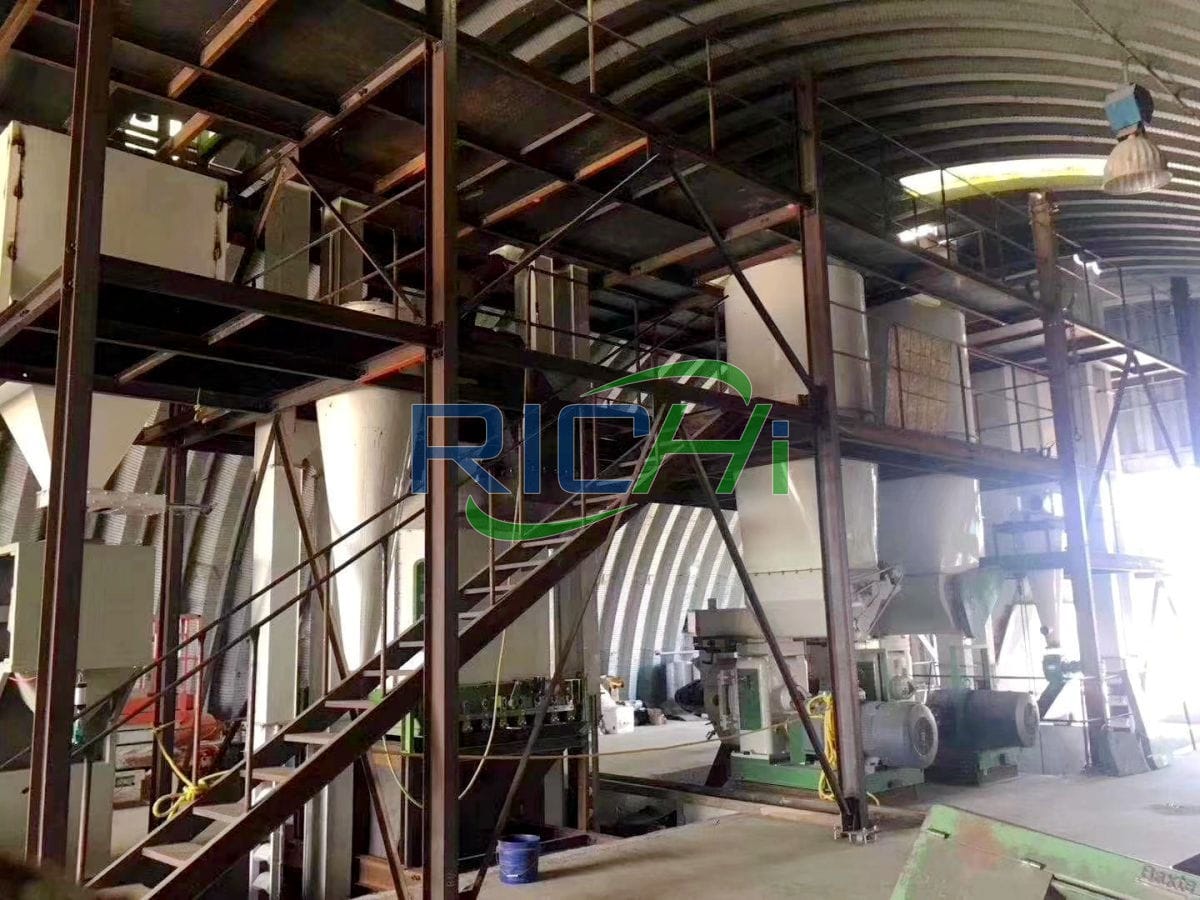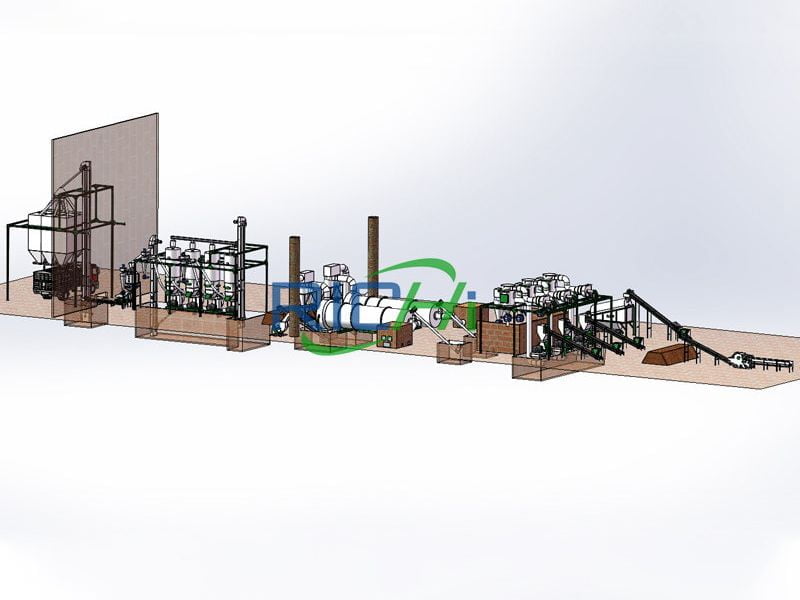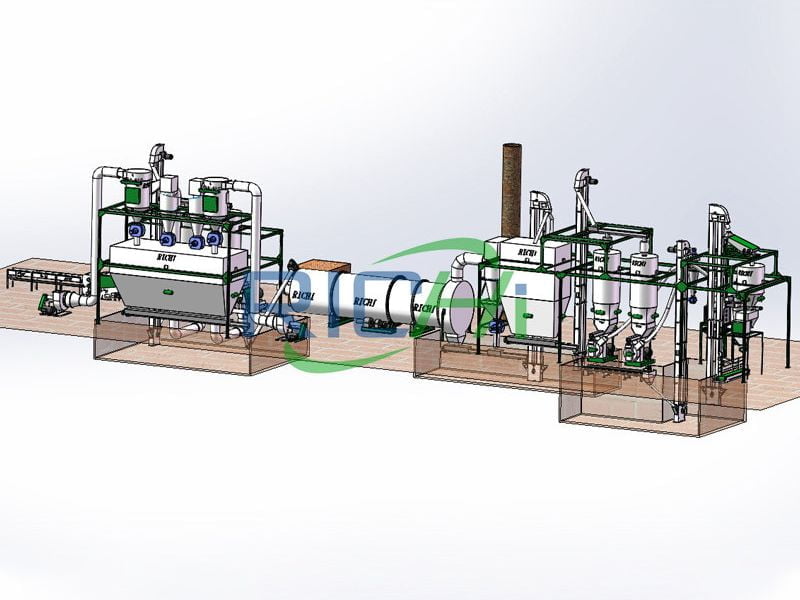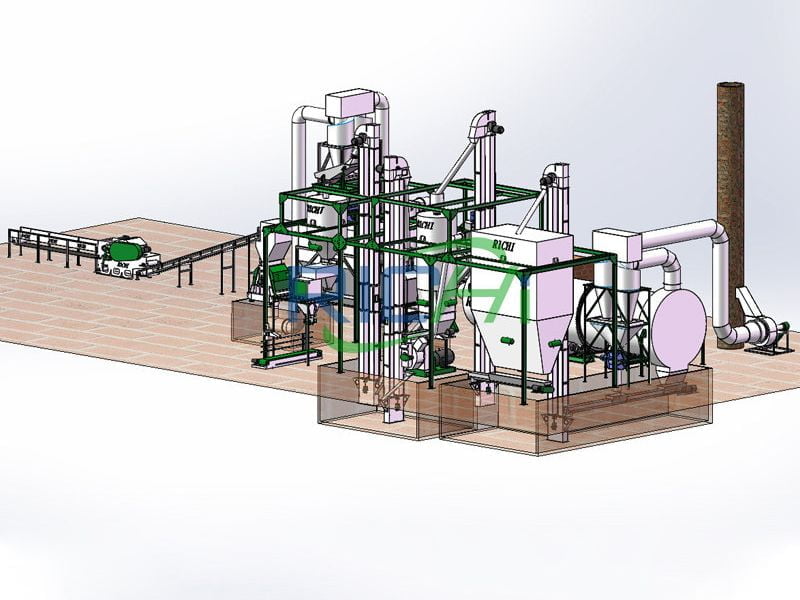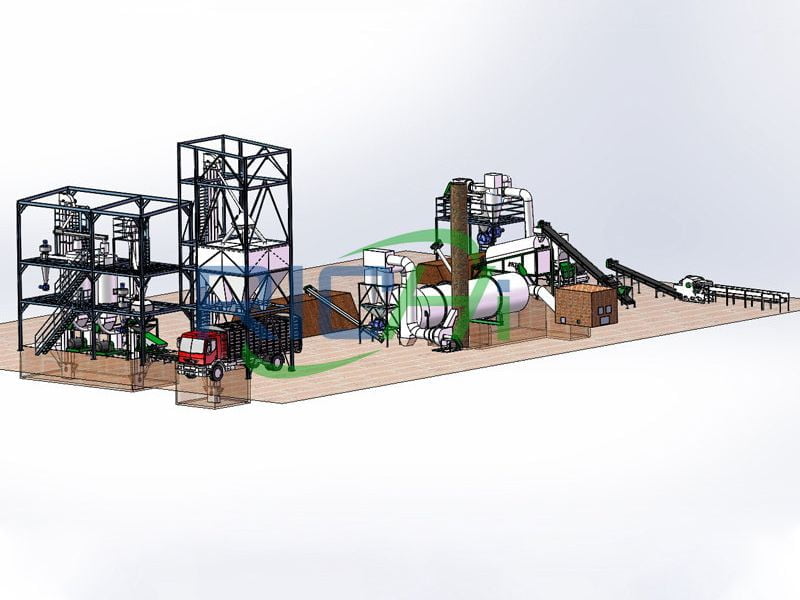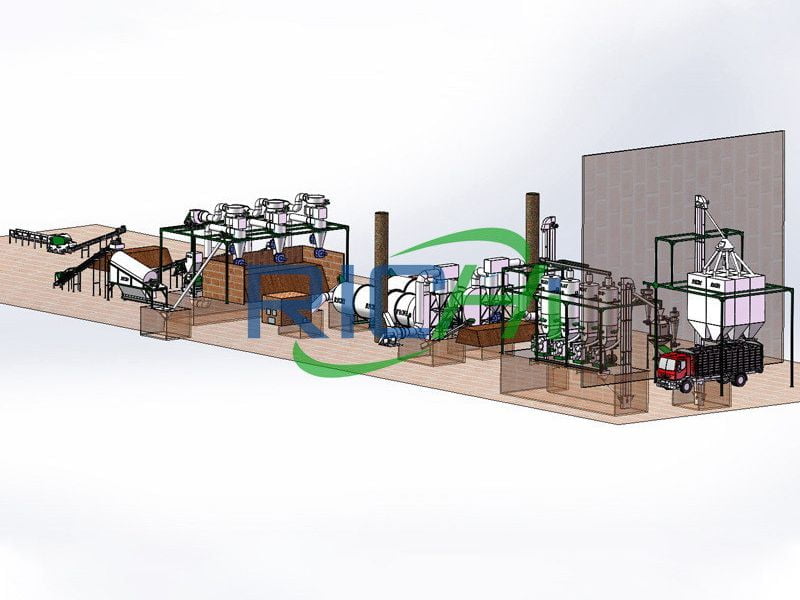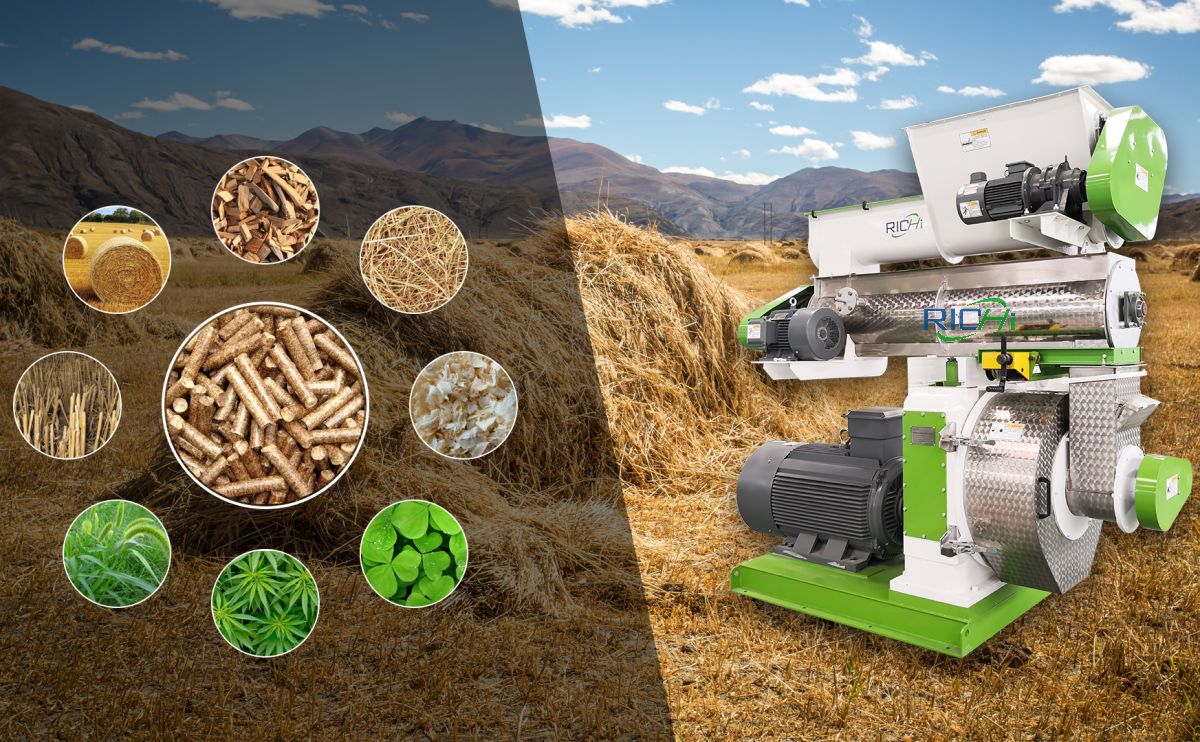
Biomass Pellet Mill For Sale
RICHI is mainly engaged in the research and development, manufacturing of biomass pellet mills,also specializes in biomass pellet mill for sale.
Our biomass pellet mill can be used to process all kinds of agricultural and forestry waste pellets (wood, straw, hay, grass, rice husk, efb bamboo, bagasse, peanut shell…).
RICHI biomass pellet mill is designed with high quality, environmental protection and intensification.
It can produce bio pellets that meet the high quality pellets standard of different countries, ideal for biomass pellet manufacturers.
Founded in 1995, Richi Machinery is mainly engaged in biomass pellet mill for sale and complete biomass pellet plant set up, providing technical solutions and supporting products.
All products have passed ISO9001:2008 international quality system certification, EU CE certification and customs union CU-TR certification. So far, it has successfully conquered thousands of customers in more than 120 countries and regions around the world.
Types Of Biomass Pellet Mill
According to the different raw materials, biomass pellet mill can be divided into:
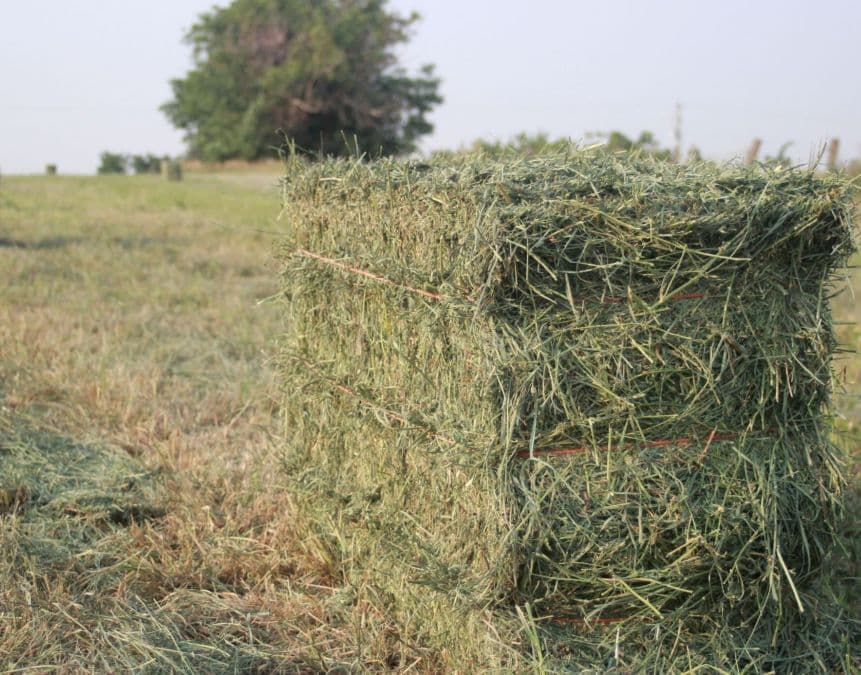
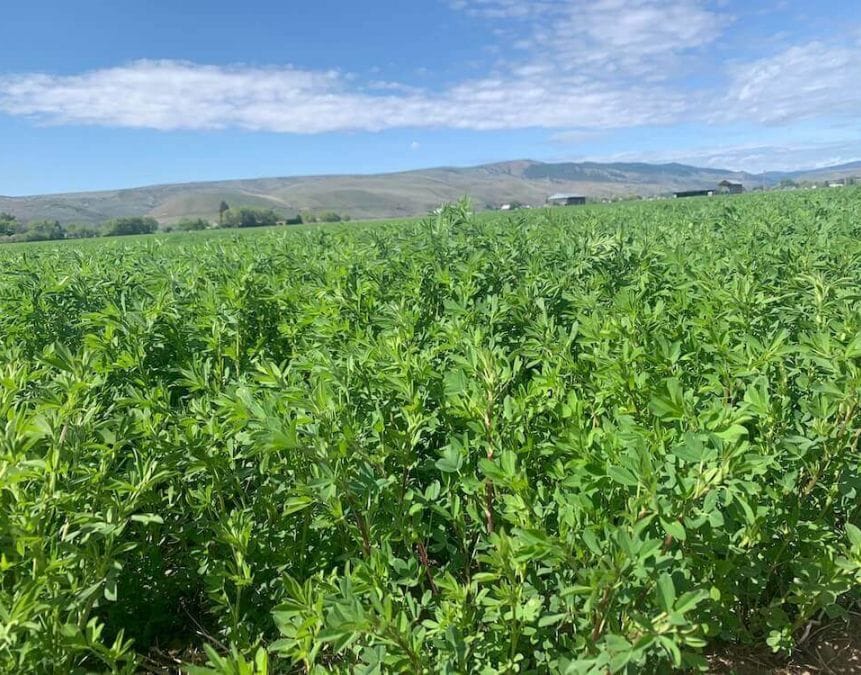
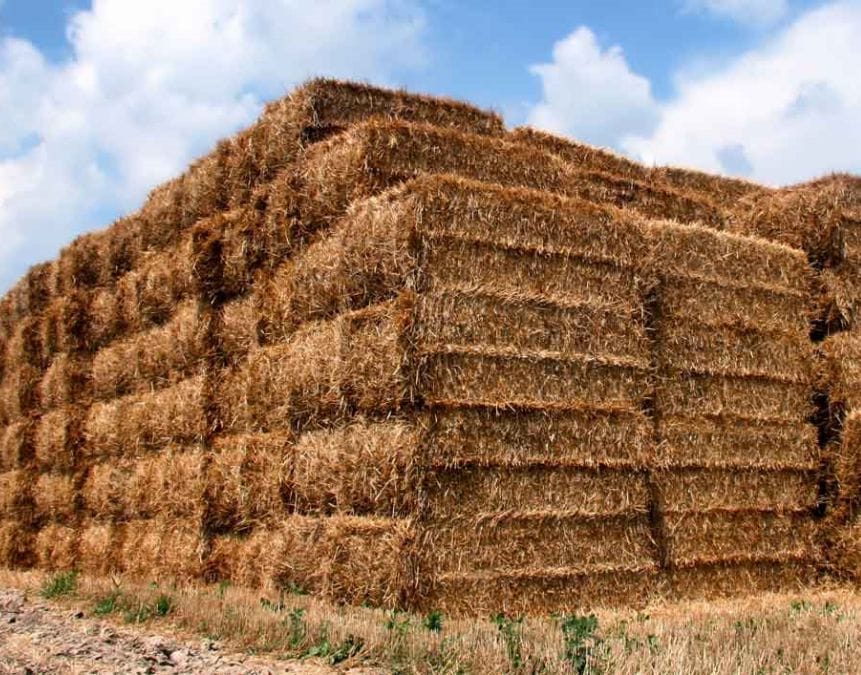
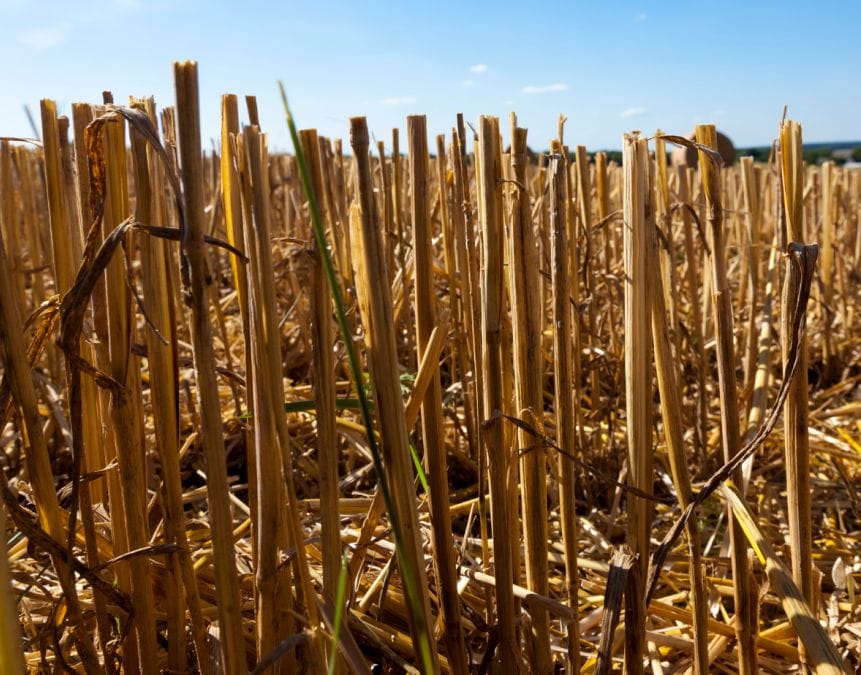
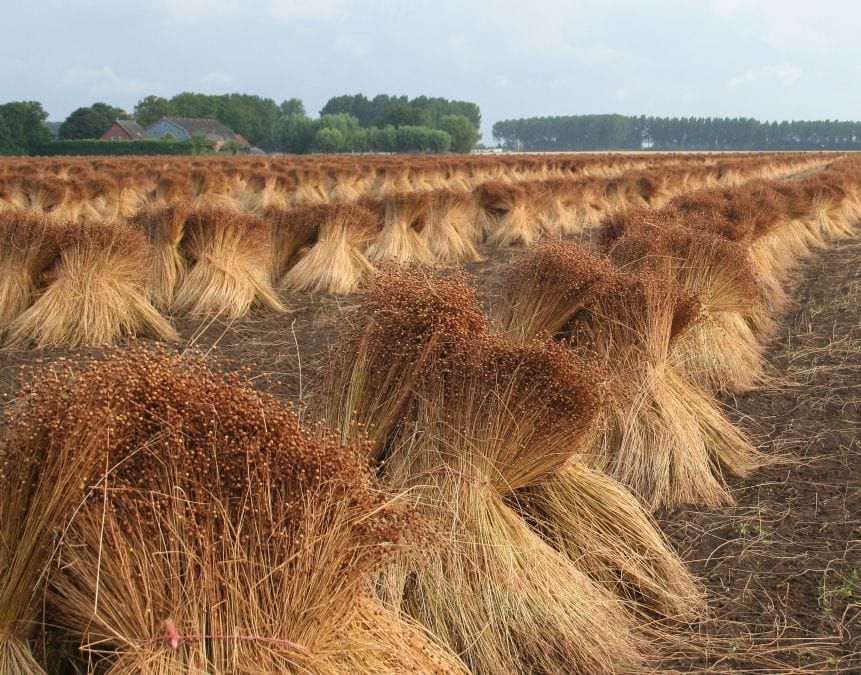
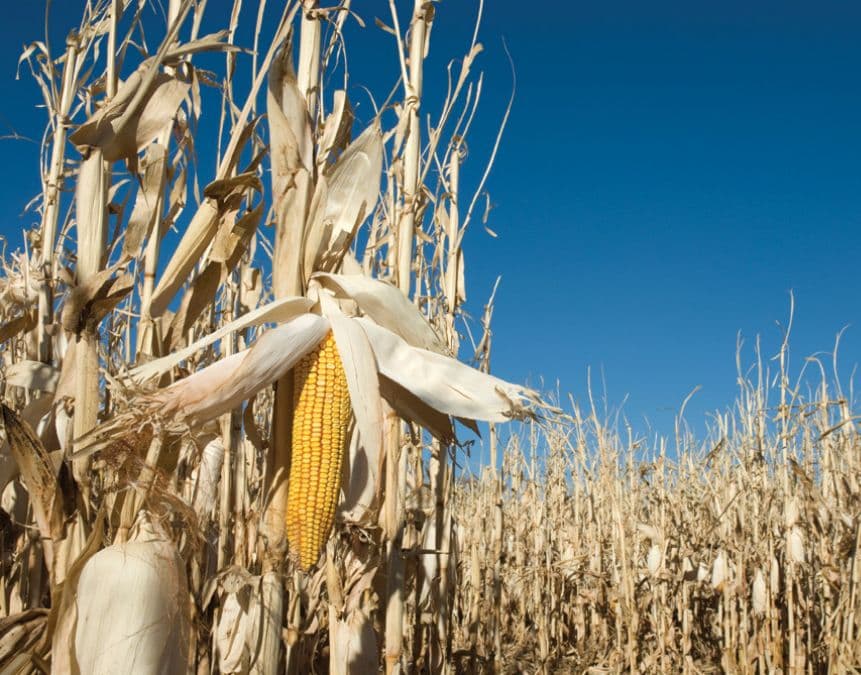
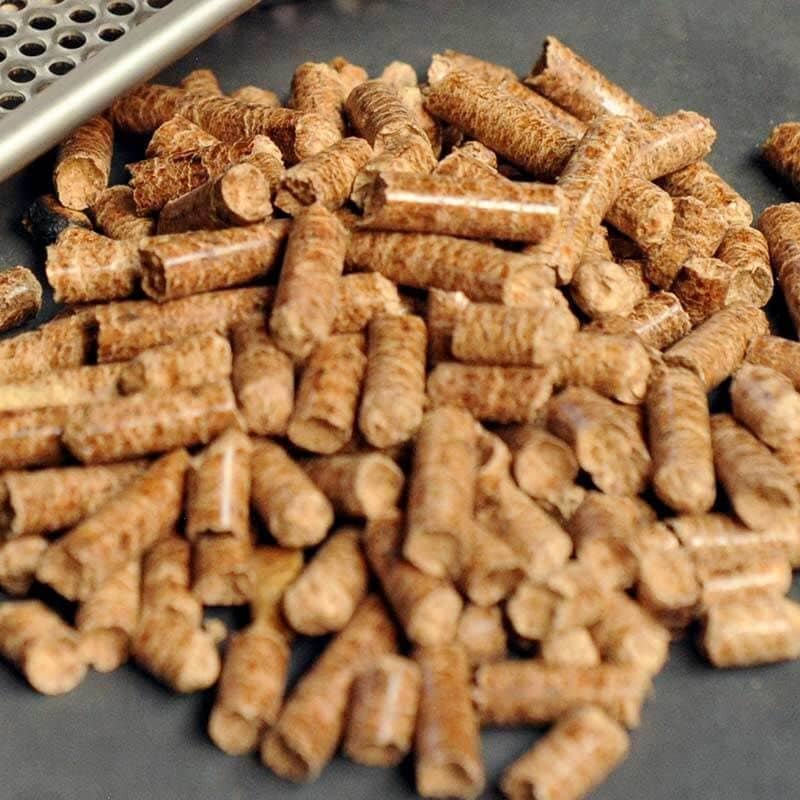
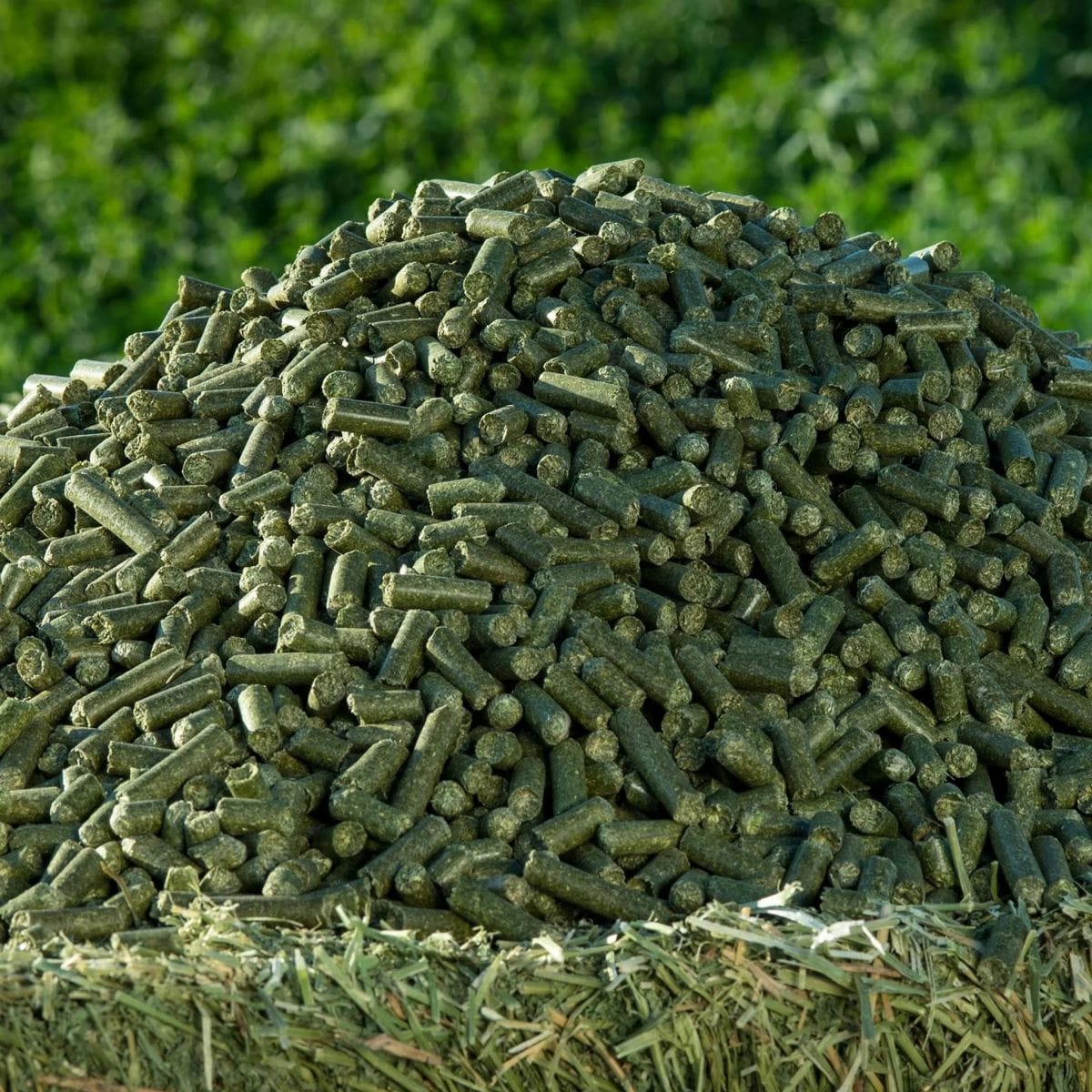
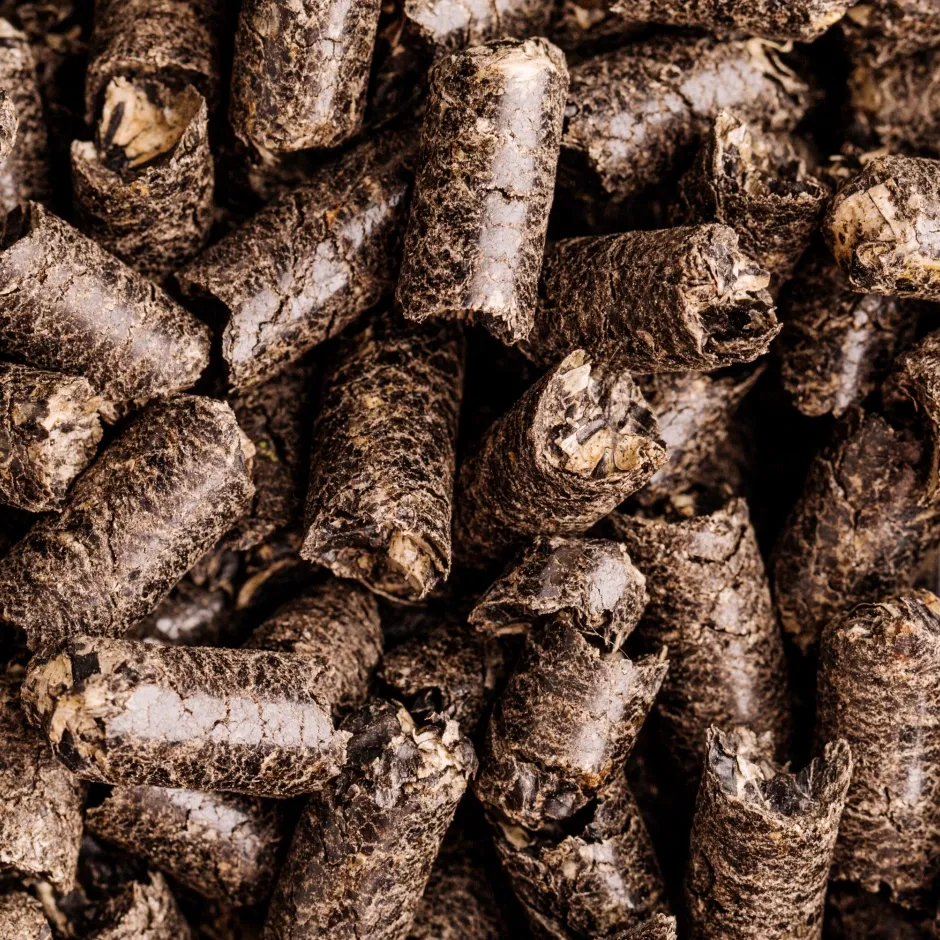
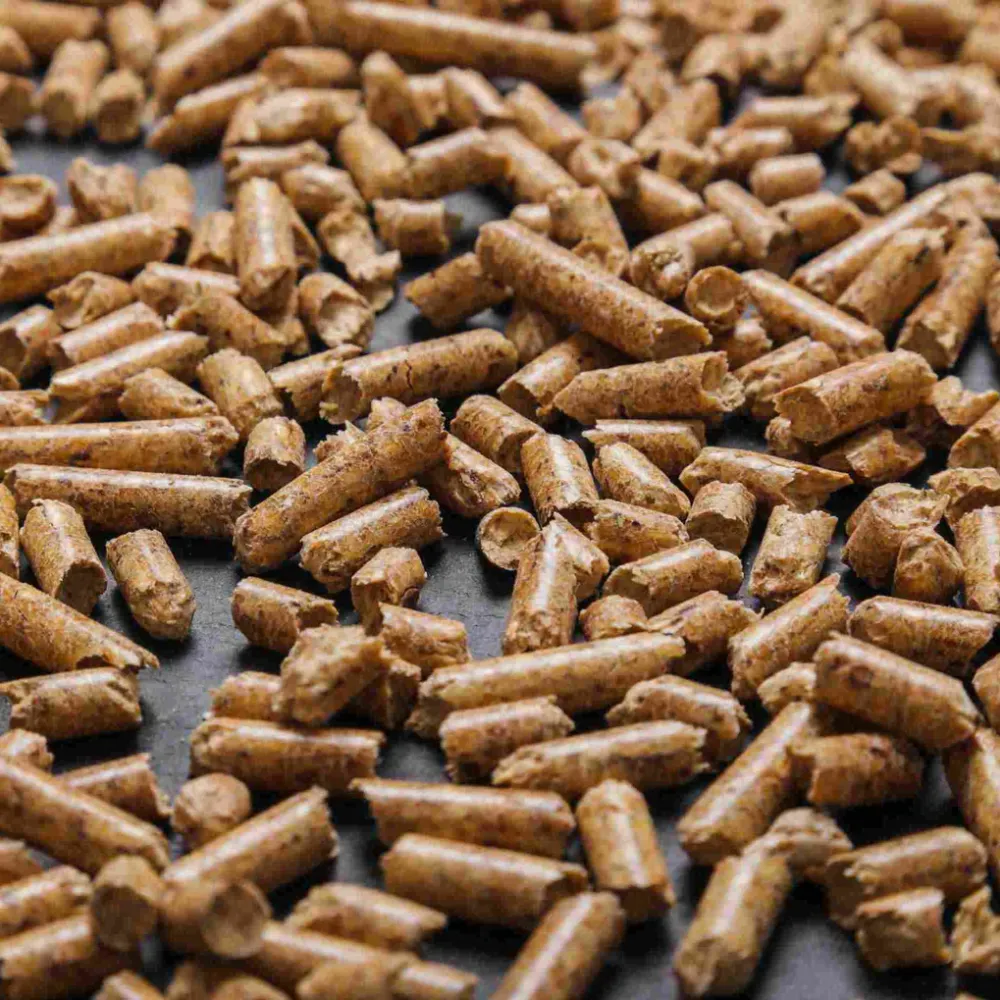
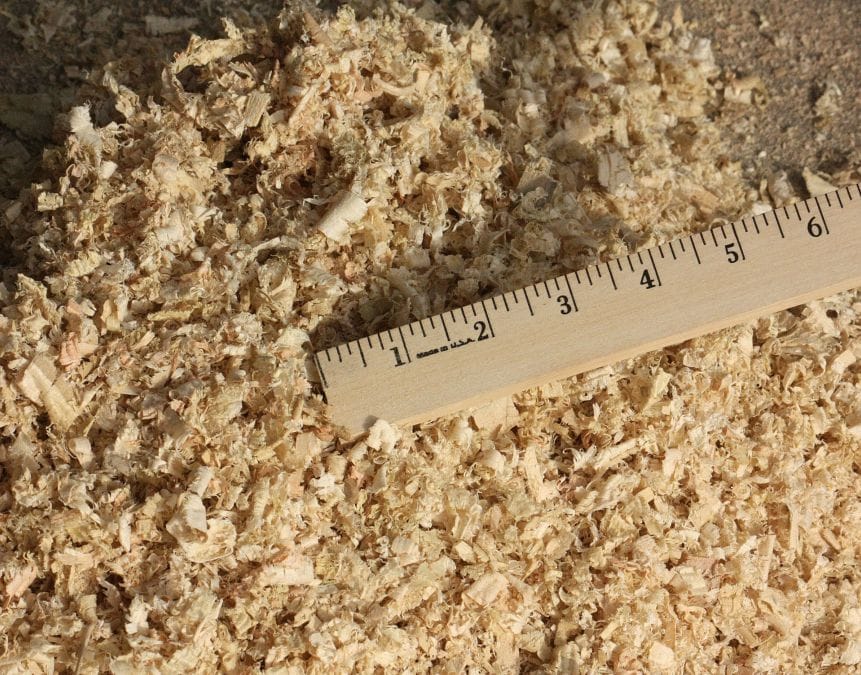
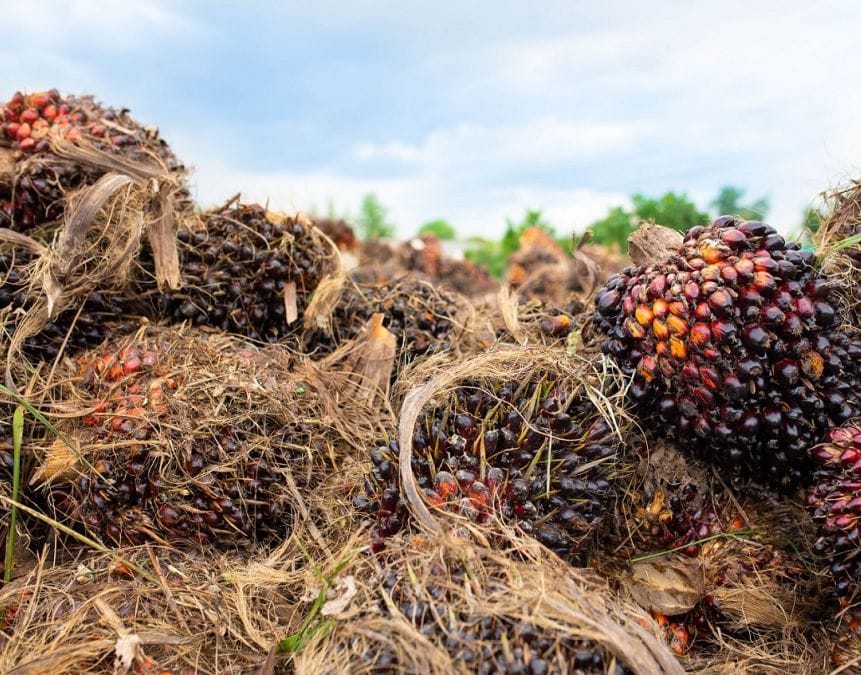
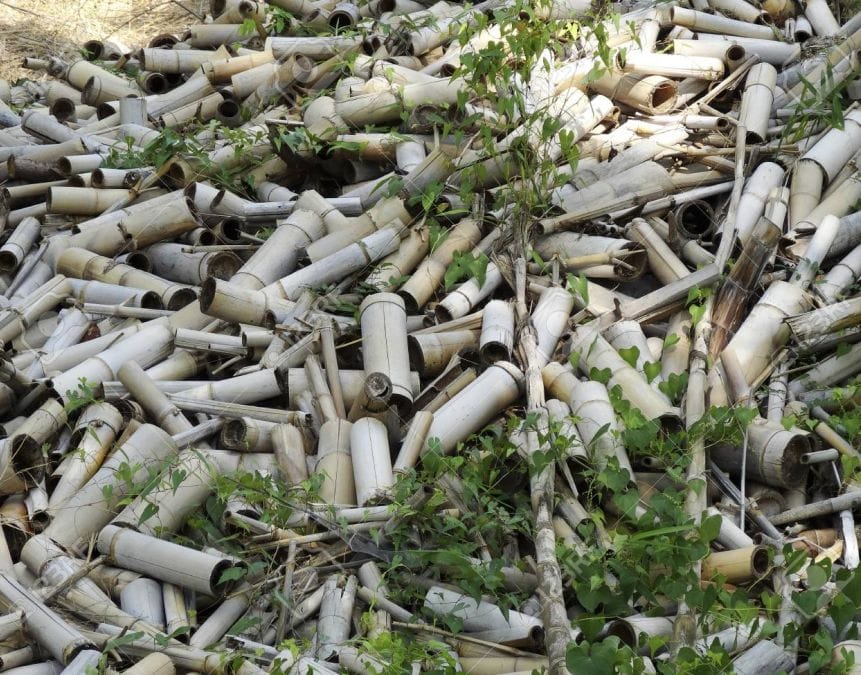
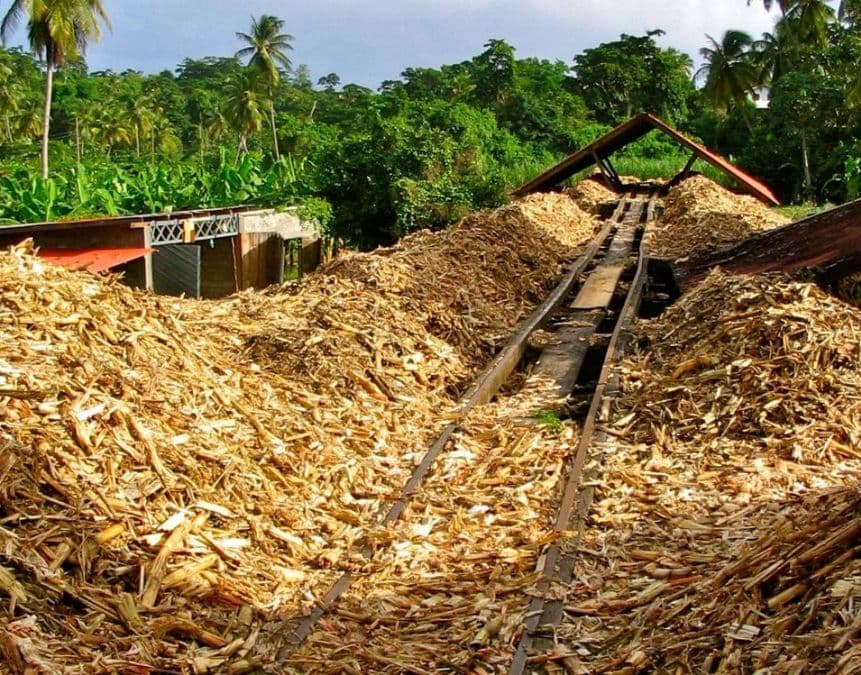

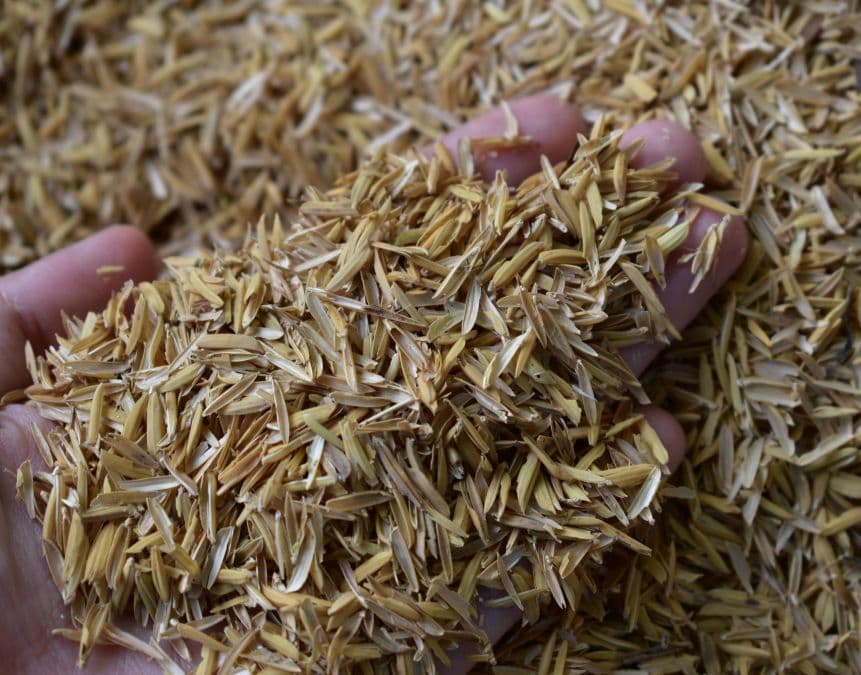
Richi Machinery is committed to the biomass pellet mill for sale, in addition to processing pellet fuels, our biomass pellet machines are currently widely used, and can also be used to process livestock feed pellets, tofu cat litter pellets, bentonite cat litter pellets, waste newspaper cat litter pellets, cardboard pellets, waste tire pellets, PET plastic pellets, etc.
Advantages Of Biomass Pellet Mill
RICHI biomass pellet mill has the characteristics of high degree of automation, convenient operation, compact equipment, reasonable process principle, smooth production, high production efficiency, good product quality, less investment and quicker results, complete product series and wide coverage, which is the current development trend of pellet manufacturing technology.
- The main drive of the biomass pellets machine adopts high-precision gear rotation, and the efficiency is about 15% higher than that of the belt drive type, and the ring die adopts the quick-release hoop type;
- The transmission part of the whole biomass pellet mill machine adopts high-quality imported bearings and oil seals to ensure high transmission efficiency, stability and low noise; the compensation type serpentine spring coupling of the international advanced level has the performance of novel structure, compactness, safety and low failure;
- The main shaft is made of forging material, with long service life and stable and reliable quality; there are a number of innovative designs on the ring die, which mainly solve the problem of ring die cracking and effectively increase the biomass pellets making machine output;
- The automatic grease lubrication system can realize automatic refueling without stopping, which is convenient for operation; the gearbox thin oil automatic circulation cooling system can effectively reduce the oil temperature of the gearbox, prolong the life of the gear transmission parts, and make the main drive more reliable;
- It is equipped with overload protection device to improve the service life of the biomass pellet mill; the arch breaking feeding device is used to avoid the material arching; the feeder, door cover and chute are all made of stainless steel for durable use;
- The specially designed forced feeding structure adopts the mixed structure of spiral + blade, which makes the feeding more effective; the forced feeding adopts the direct drive of the worm gear reducer, and the transmission efficiency is higher.
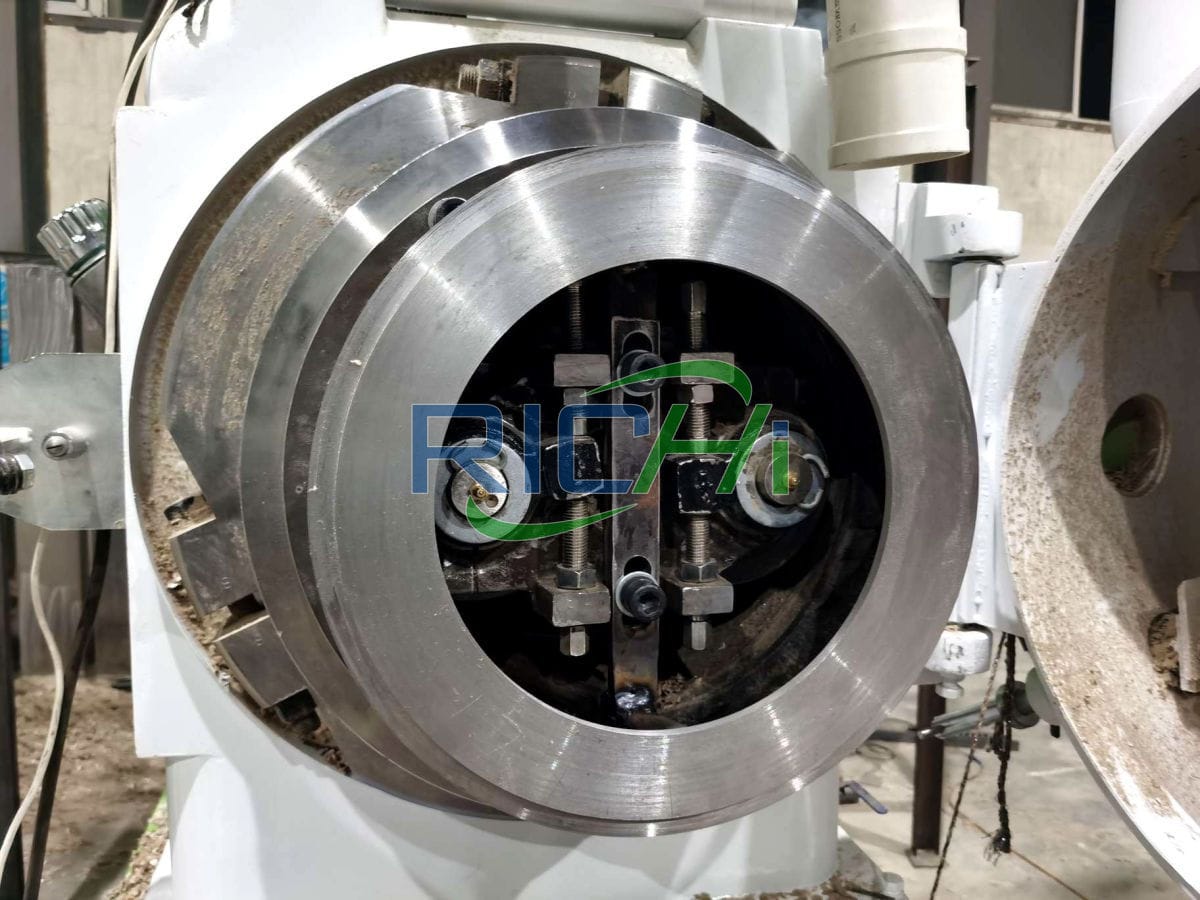
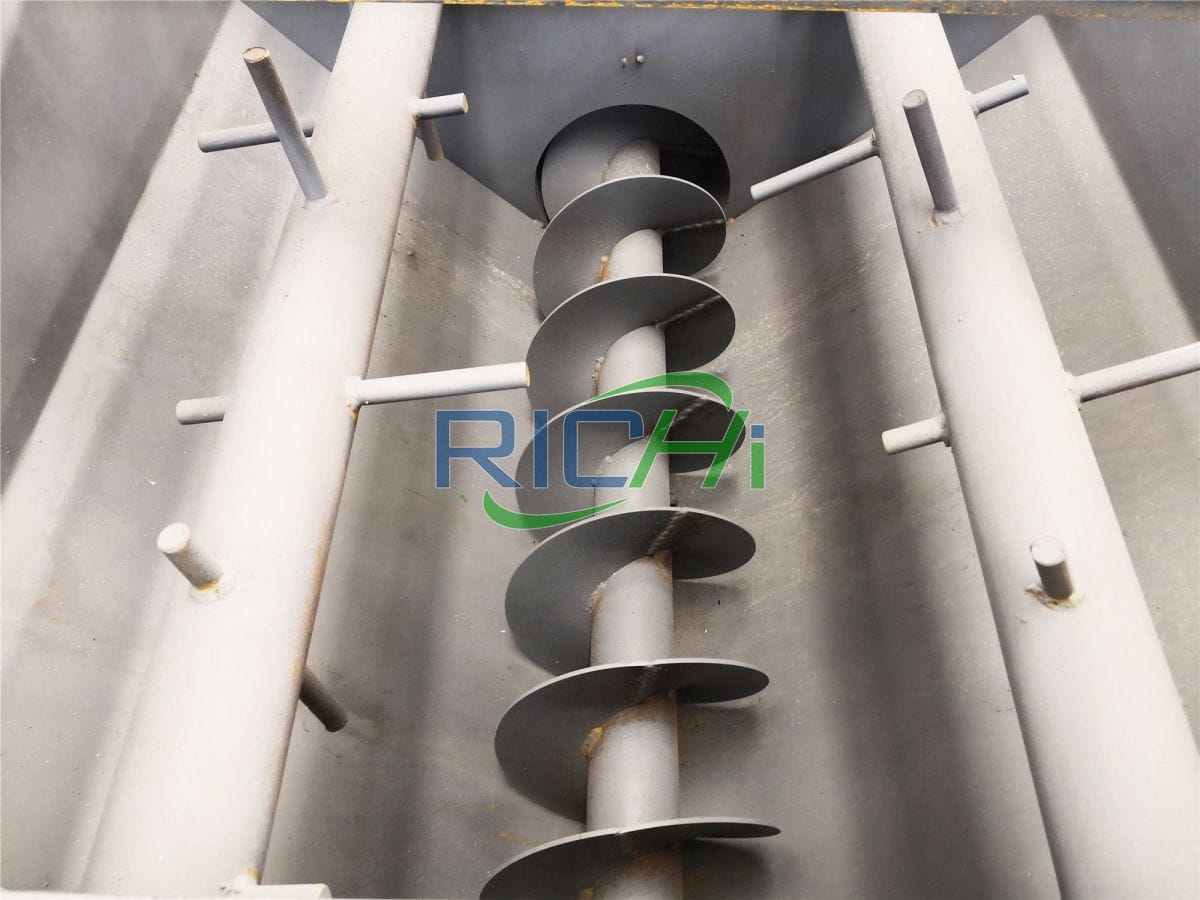
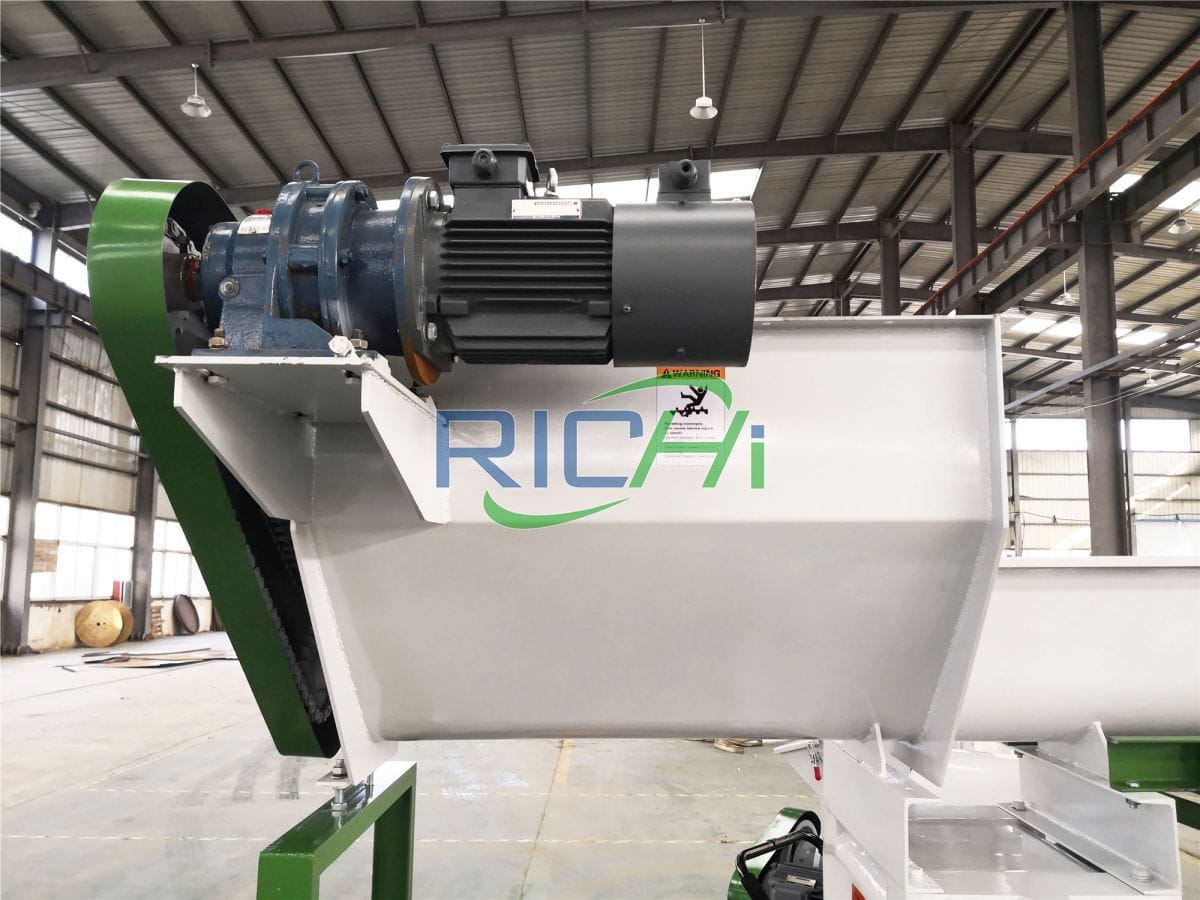
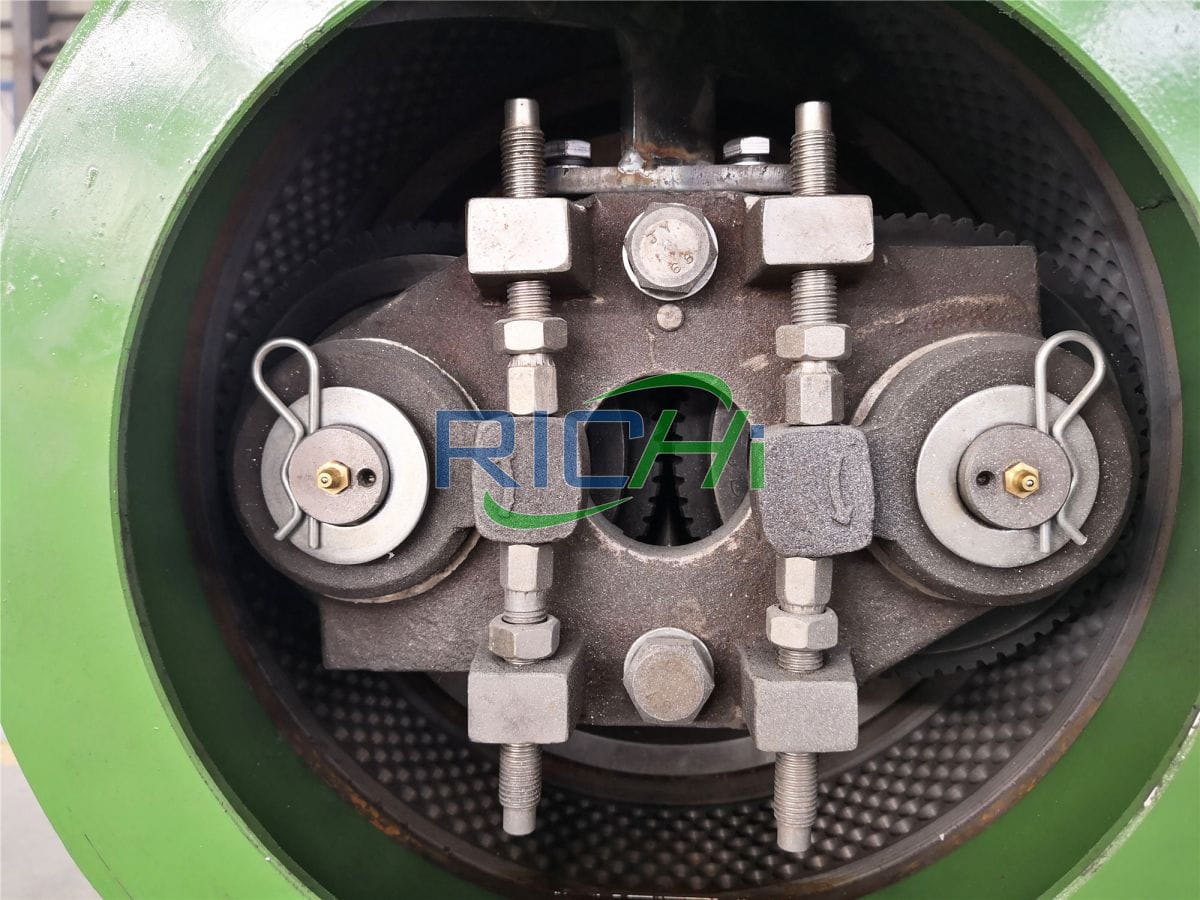
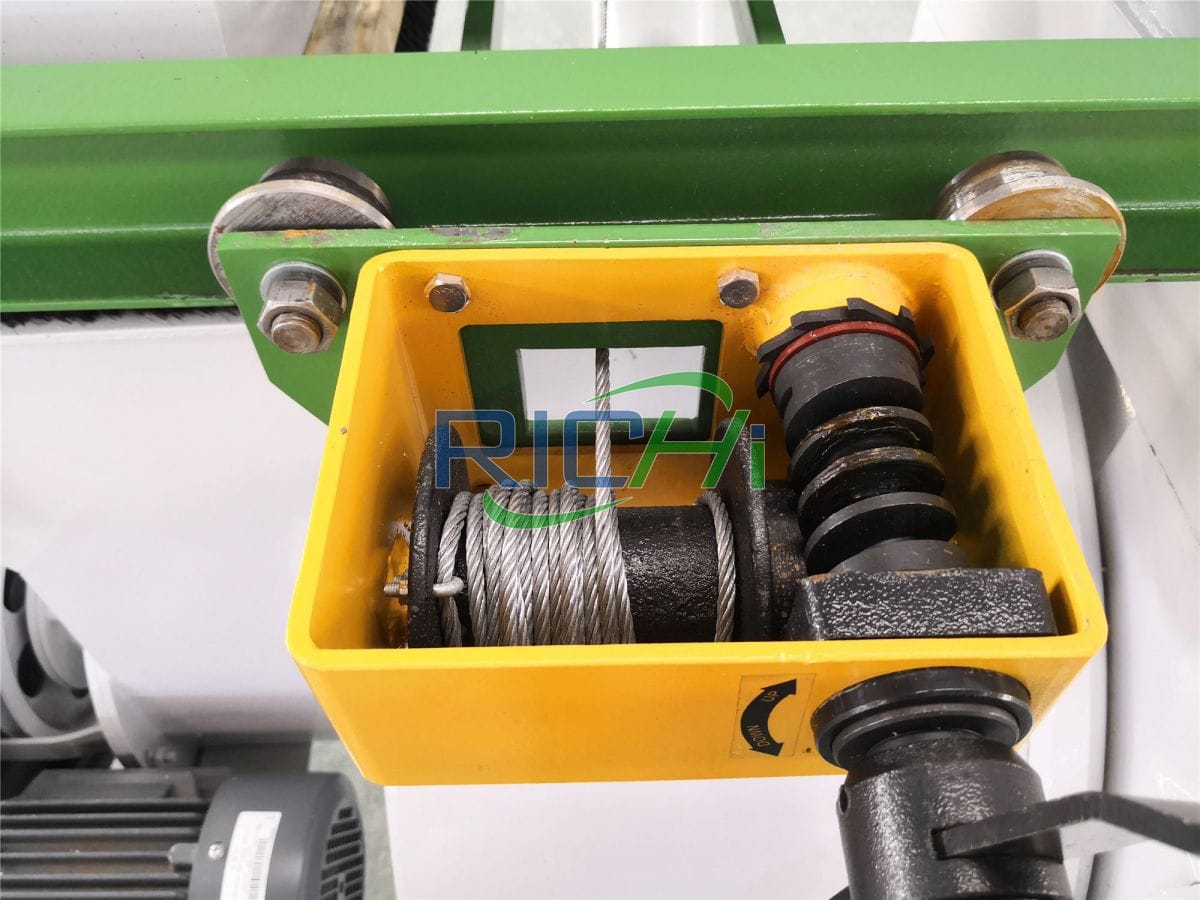
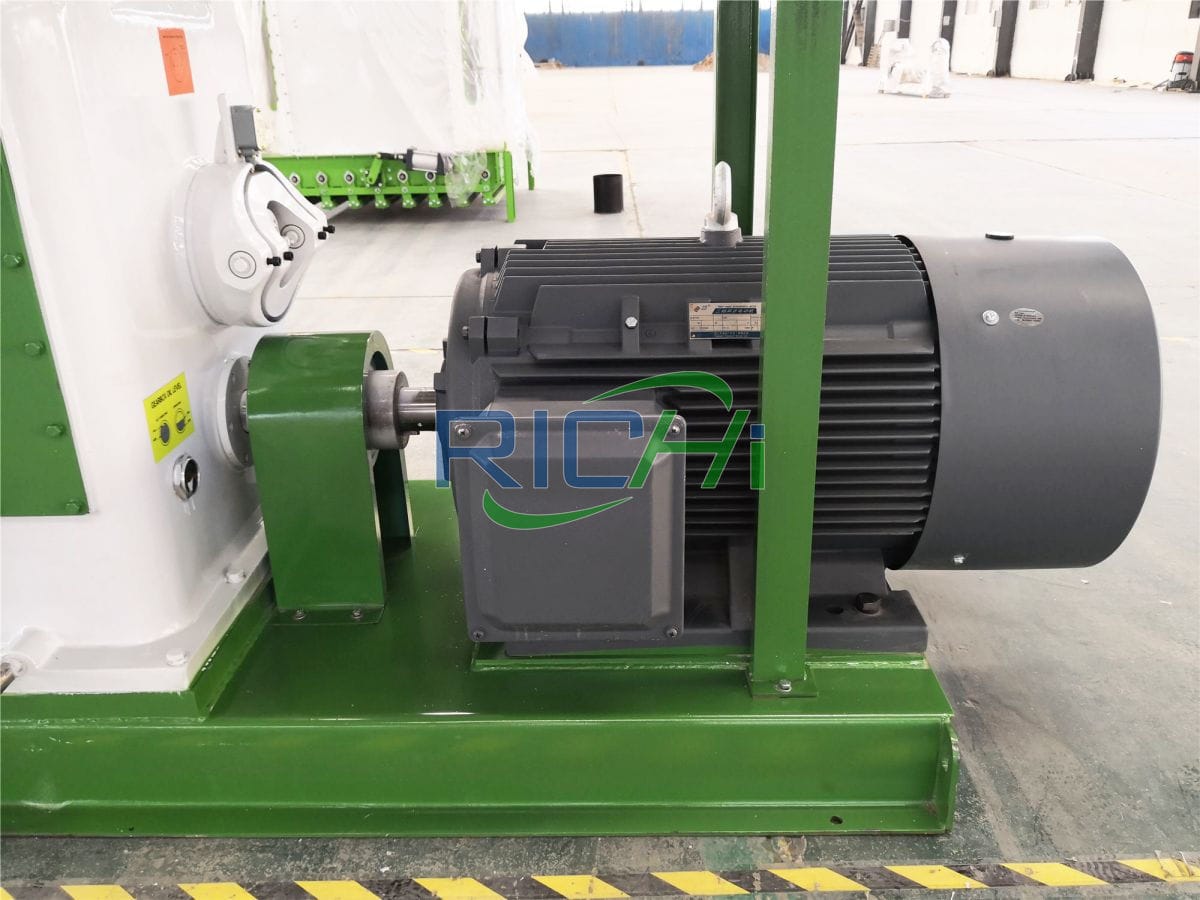
Richi Machinery is mainly engaged in the R&D and manufacturing of biomass pellet mills and biomass pellet production line projects using various wastes as raw materials, providing technical solutions and supporting products.
We have exported biomass pellet mill for sale Asia, North America, Europe, Oceania, South America, and have reached strategic cooperation with more than 2,000 global customers.
Model And Parameters Of Biomass Pellet Mill

MZLH320 Small Biomass Pellet Machine
- Power: 37KW
- Capacity(wood/bamboo): 300-500KG/H
- Capacity(husk/EFB): 300-500KG/H
- Capacity(grass/straw): 700-4000KG/H
- Final Pellet: 2-12mm
- Weight(KG): 2500

MZLH350 Biomass Pellet Press
- Power: 55KW
- Capacity(wood/bamboo): 500-700KG/H
- Capacity(husk/EFB): 500-700KG/H
- Capacity(grass/straw): 1-6 T/H
- Final Pellet: 2-12mm
- Weight(KG): 3500

MZLH420 Biomass Granulator
- Power: 90KW
- Capacity(wood/bamboo): 1.0-1.5 T/H
- Capacity(husk/EFB): 1.0-1.5 T/H
- Capacity(grass/straw): 2-10 T/H
- Final Pellet: 2-12mm
- Weight(KG): 4000

MZLH520 Biomass fuel Pellet Machine
- Power: 132KW
- Capacity(wood/bamboo): 2.0-2.5 T/H
- Capacity(husk/EFB): 2.0-2.5 T/H
- Capacity(grass/straw): 3-15 T/H
- Final Pellet: 2-12 mm
- Weight(KG): 4500

MZLH768 Biomass Pellet Making Machine
- Power: 250KW
- Capacity(wood/bamboo): 2.5-4 T/H
- Capacity(husk/EFB/): 2.5-4 T/H
- Capacity(grass/straw): 4-30 T/H
- Final Pellet: 2-12 mm
- Weight(KG): 5000

MZLH858 Biomass Pellet Machine For Sale
- Power: 280KW
- Capacity(wood/bamboo): 4-5 T/H
- Capacity(husk/EFB): 4-.5 T/H
- Capacity(grass/straw): 4-40 T/H
- Final Pellet: 2-12 mm
- Weight(KG): 5500
Customizable Design:
Customizable Plan: We can customize the biomass pellet mill the world according to the actual needs of customers, including voltage, electrical components, product color matching, and can also customize biomass pellet mill process, biomass pellet mill parts and different compression ratio according to different biomass raw materials, etc.
Applicable raw materials:Various agricultural and forestry wastes and municipal wastes.
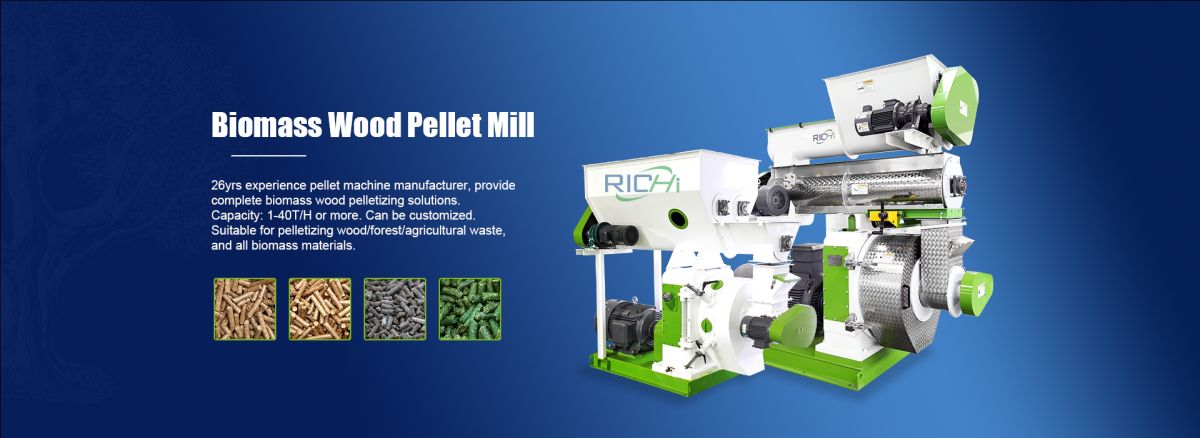
| Model | MZLH320 | MZLH350 | MZLH420 | MZLH520 | MZLH768 | MZLH858 |
| Output (t/h) | 0.3~4 | 0.5~6 | 1.0~10 | 2.0~15 | 2.5~30 | 4~40 |
| Main motor power (kw) | 22 | 37 | 90 | 132 | 250 | 280 |
| Main motor series | 8P | |||||
| Ring die diameter (mm) | 320 | 350 | 420 | 520 | 762 | 858 |
| Finished pellet diameter (mm) | 6-12mm | |||||
| Device Configuration | Ring die material: 42CrMo Stainless steel feeder: with anti-caking function Door of pelleting room: 6mm /SUS304 Forced feeding: Worm gear reducer Gear box: HT250 Gear: 42CrMo Gear shaft: 42CrMo Spindle: 42CrMo Empty shaft: 42CrMo Bearings: The gear shaft and main shaft bearings are SKF, and the pressure roller bearings are domestic high-quality bearings Oil seal: Germany/Taiwan Overload mechanical protection: safety pin Serpentine spring coupling drive Lubrication system: Configurable automatic oil injection system | |||||
Richi Machinery focus on biomass pellet mill for sale, and always in accordance with market trends and customer needs, constantly seeking changes and improving, timely innovation, and relying on its standard body, reasonable configuration, stable performance, mature design, has won the favor of customers on all continents around the world.
It has played a positive role in major projects undertaken and participated by global customers.
Biomass Pellet Mill Price
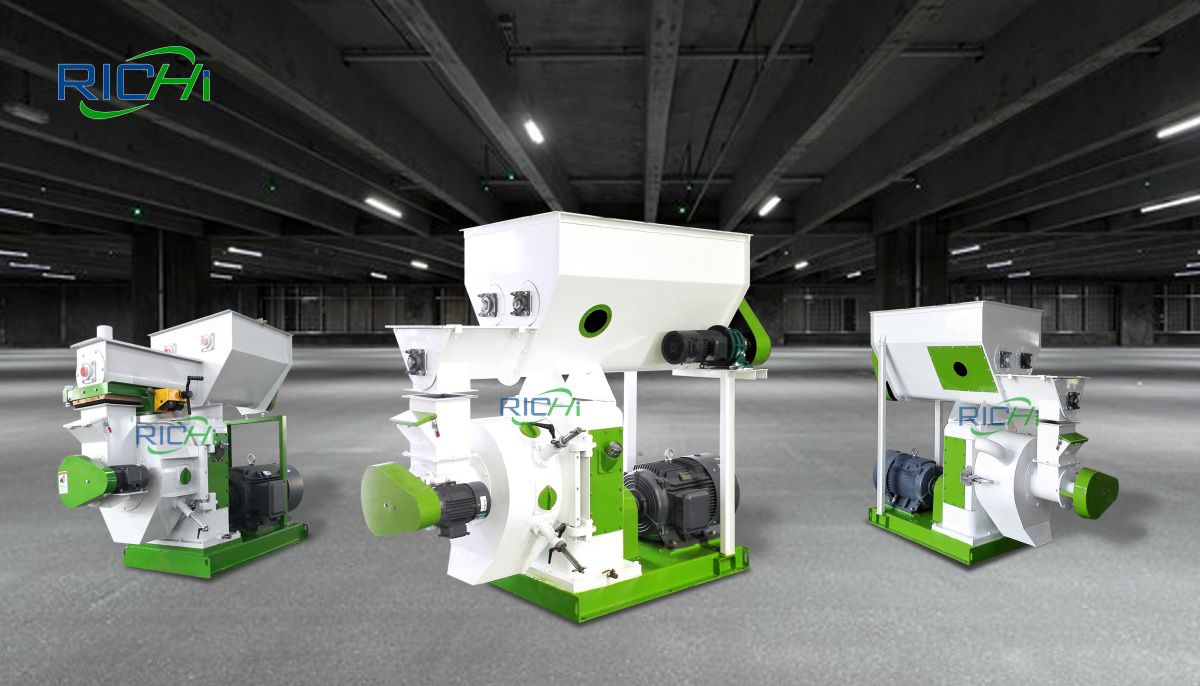
The biomass pellet machine price is 10000-100000 USD. Of course, the higher the output, the more expensive the biomass pellet machine price.
At the same time, it is also related to the biomass pellet mill manufacturer. Different manufacturers, different production processes, and equipment materials will also be different. There will also be big differences.
Therefore, we usually make reasonable quotations according to the customer’s biomass fuel pellet machine selection.
In addition, due to the particularity of biomass pellet processing, it is usually necessary to combine multiple biomass pellet mill machinery into a complete biomass pellet production line system for pellet processing.
According to the needs of different biomass types and different yields, the selected biomass pellet mill should also be targeted.
As for the investment budget of the complete biomass pellet production line, it also needs to be determined according to the actual selection.
Each biomass pellet mill price is different. In addition to the difference in capacity, our biomass pellet mill can also be customized according to the customer’s raw materials, installation location and other factors. So, if you are interested in our biomass pellet making machine, welcome to contact us to get the biomass pellet mill price.
Each biomass pellet mill price is different. In addition to the difference in capacity, our biomass pellet mill can also be customized according to the customer’s raw materials, installation location and other factors.
So, if you are interested in our biomass pellet making machine, welcome to contact us to get the biomass pellet mill price.
Biomass Pellet Mill For Sale The World
As a manufacturer specializing in biomass pellet mill for sale, Richi Pellet Machine actively promotes the global strategy, cultivates an international business model, and has accumulated rich practical experience. The customer market covers six continents: Asia, Europe, Africa, North and South America and Oceania.
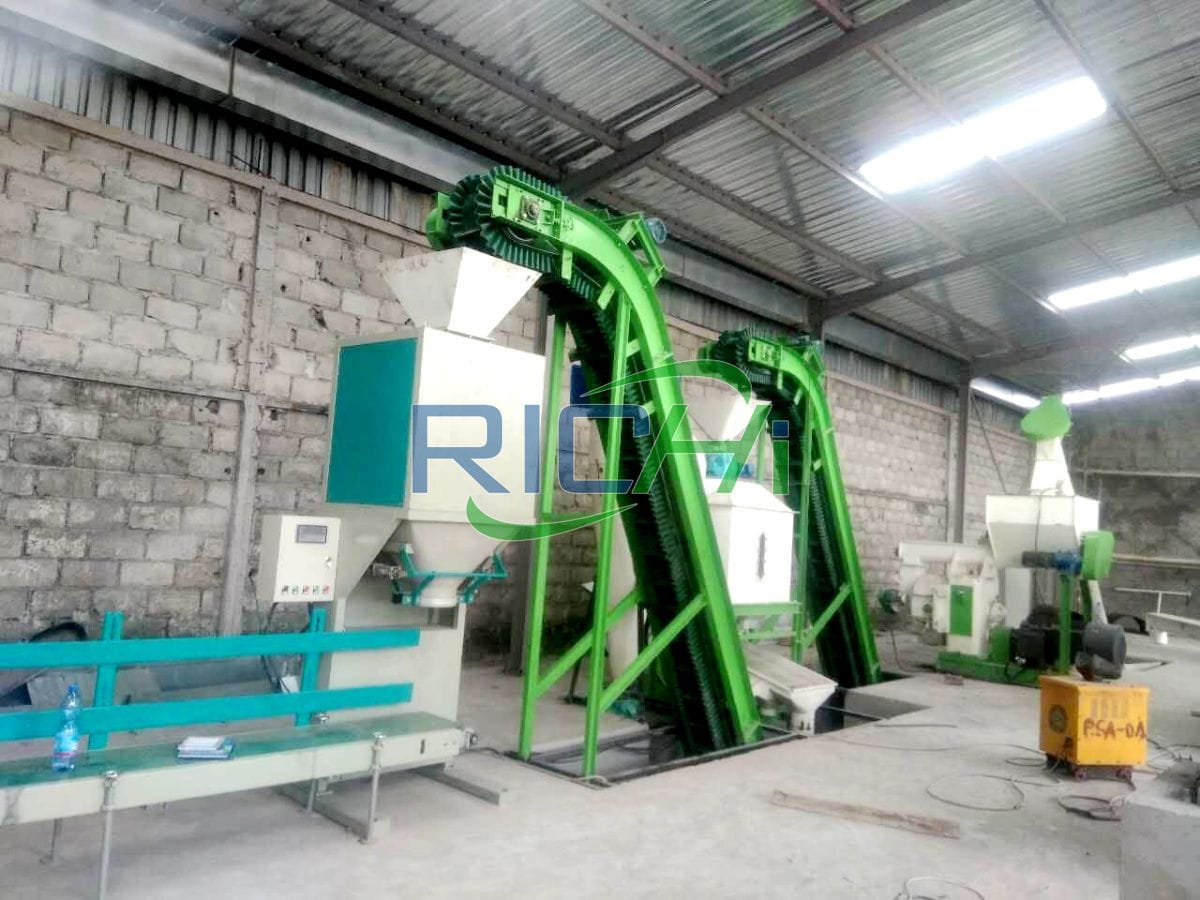
Congo 1-1.2 T/H Biomass Pellet Mill Plant
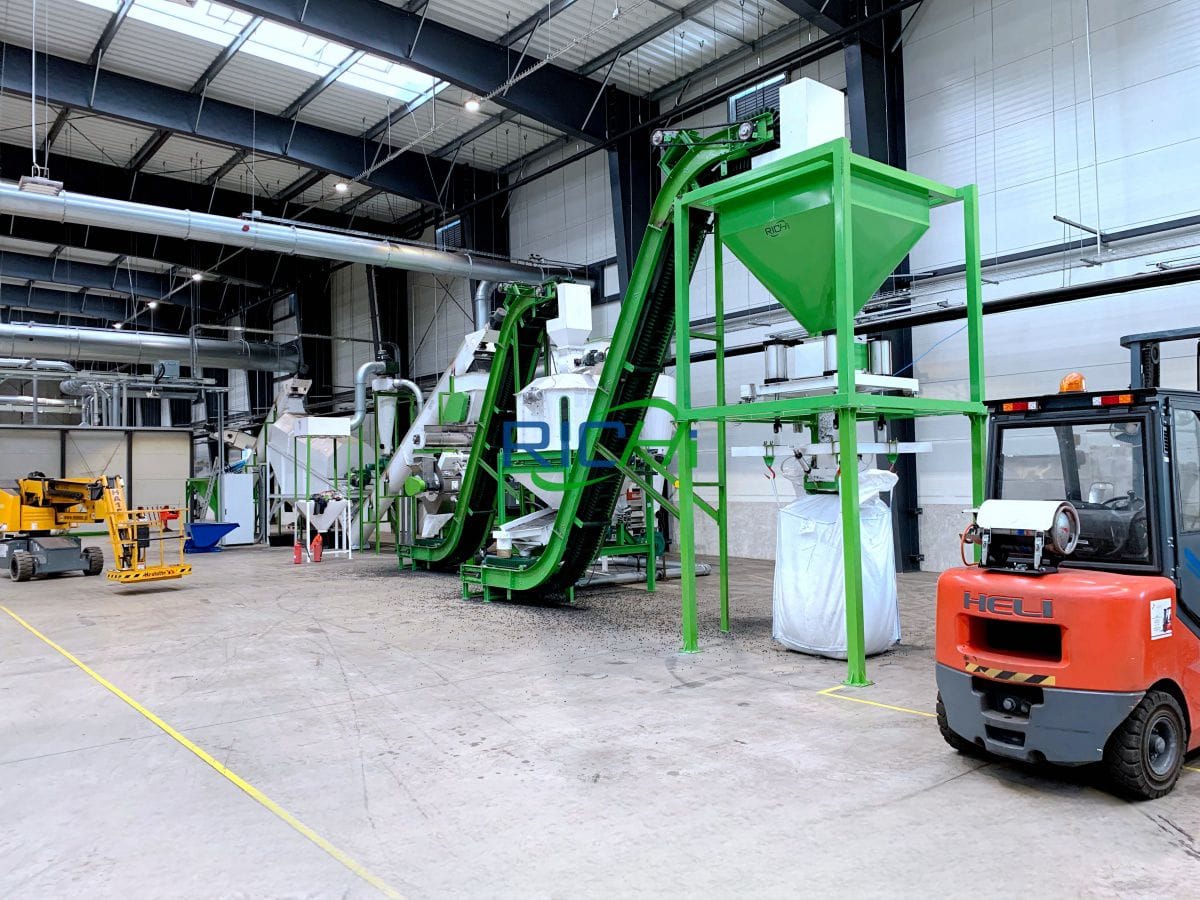
5T/H Biomass Pellet Mill For Sale Austria
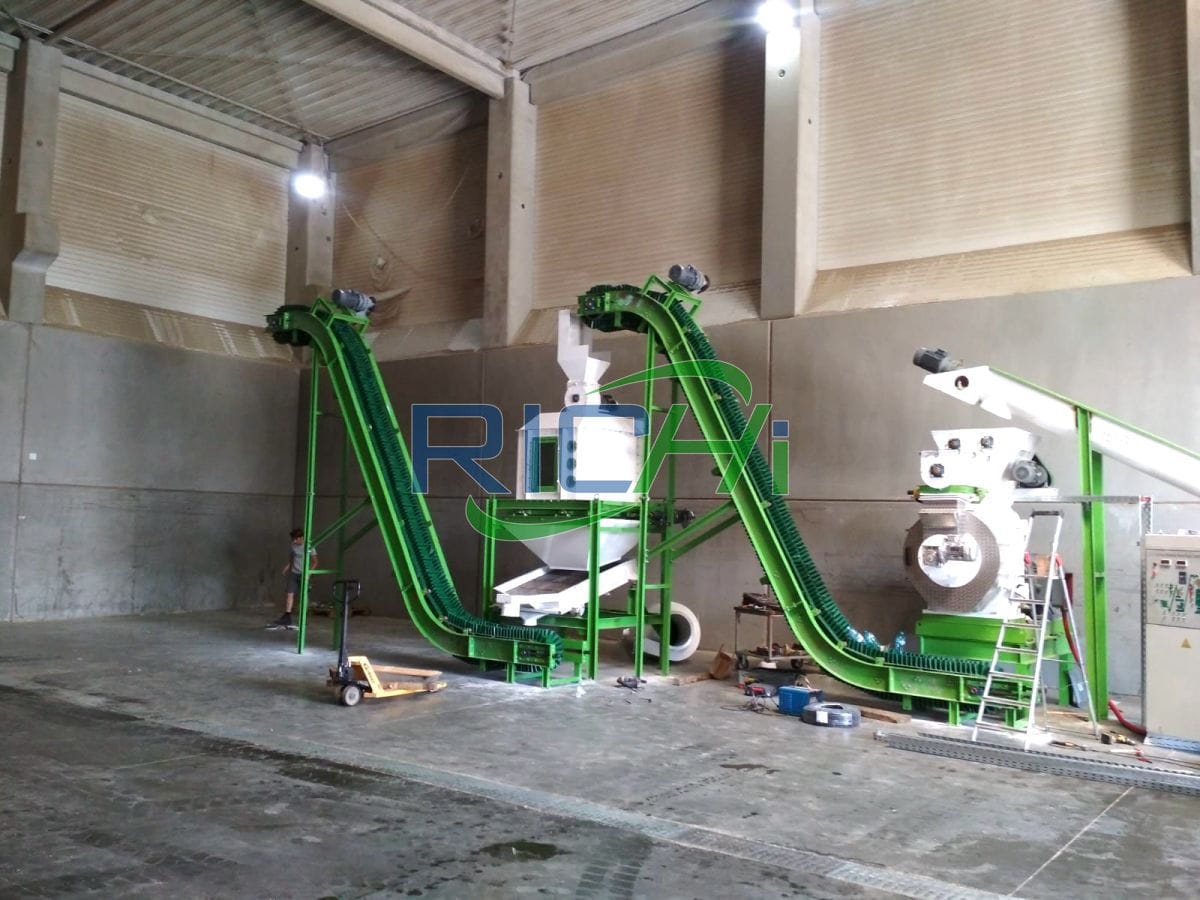
2-2.5T/H Biomass Pellet Mill For Sale Romania
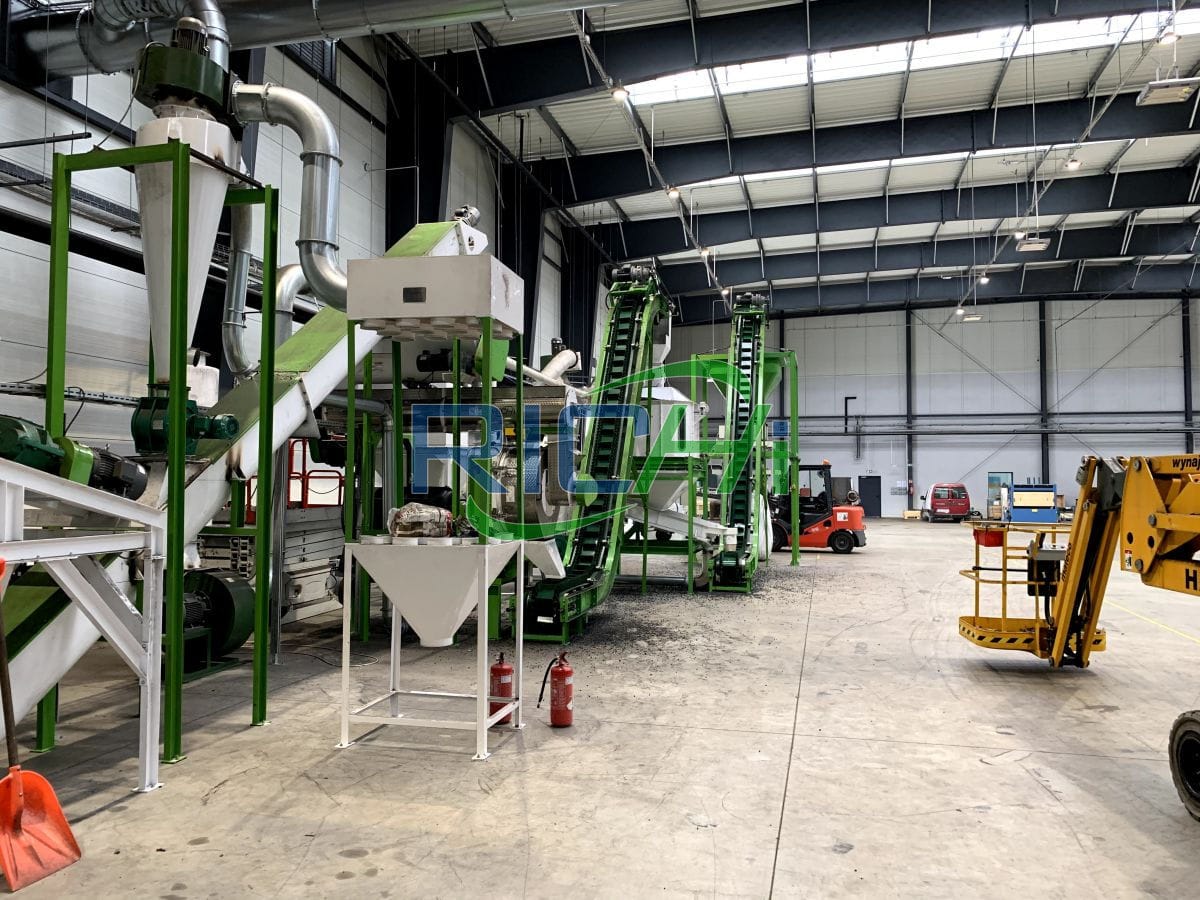
2-3T/H Biomass Pellet Mill For Sale Poland
More Biomass Pellet Mill Projects (Completed)
- 2-2.5 T/H biomass wood pellet mill for sale Germany
- 1-1.5 T/H wood biomass pellet mill for sale Iceland
- 1-1.2T/H biomass pellet mill for sale Congo
- 10T/H wood pellet mill for sale Mexico
- 2-2.5T/H biomass pellet mill line for sale Thailand
- MZLH350 wood pellet mill machine for sale Thailand
- MZLH420 biomass sawdust pellet mill for sale Malaysia
- 2T/H biomass pellet mill plant for sale Singapore
- MZLH320 sawdust wood pelletizer for sale Indonesia
- 4-5T/H sawdust biomass pellet mill for sale Indonesia
- …
More Projects Under Construction
- 1.5T wood biomass pellet production line for sale Japan
- MZLH350 wood pellet making machine for sale Korea
- MZLH420 and MZLH520 wood granulator for sale Brazil
- 4-5T/h Grass pellet machine for sale Argentina
- 2-3T/H wood pellet machine for sale Trinia Tobago
- 1-1.2T/H Complete wood pellet production line in Angola
- MZLH320 wood biomass pellet mill for sale South Africa
- 4-5T/H biomass pellet mill for sale Argentina
- 5T/H biomass pellet line in Brazil
- 2-2.5T/H biomass pellet palnt for sale Vietnam
- …
We have hundreds of biomass pellet mill & biomass pellet production line projects (completed and under construction), no matter what kind of biomass or biomass form your raw material is, you are welcome to consult Richi Machinery at any time, I believe our experience can effectively help you with biomass pellet production.
Working Principle Of Biomass Pellets Machine
RICHI biomass pellet machine adopts ring die and pressing roller as the main working parts, mainly composed of feeding system, stirring and tempering system, transmission system and molding system.
The working principle of the biomass pellet mill machine:
The motor drives the ring die to rotate. Due to the action of friction, the material on the ring die drives the roller to rotate. After the material is fed into the pressing chamber by the forced feeder, it rotates with the ring die and the pressing roller, and the two squeeze each other, and the material sandwiched between them is continuously compressed.
The raw material is pressed into the die hole of the ring die, and after a period of pressure holding and shaping, the biomass pellet fuel with a certain density is formed.
As a manufacturer focusing on the biomass pellet mill for sale, RICHI biomass pellets making machine is used to hot-press the biomass without adding any binder. The molding is mainly due to the existence of lignin in the biomass.
Lignin is amorphous, has no melting point, but has a softening point. After testing, when the temperature is between 70 and 100℃, its adhesive force begins to increase, and when the temperature is between 200 and 300℃, it can be melted. The suitable temperature for hot pressing is 140-200℃.
Design Of Ring Die Biomass Pellet Mill Parts
01 Overall Design Of Biomass Pellet Maker Machine
The ring die biomass pellet machine adopts the ring die method and the cold pressing molding mechanism.
During biomass fuel pellet machine operation, the crushed biomass raw materials are fed from the feeding port, and transferred to the ring die cavity through the feeding screw, and the raw materials are thrown out through the feeding nozzle.
Under the action of centrifugal force and the feeding nozzle, the raw materials are evenly spread on the inner surface of the ring die.
The power generated by the motor is transmitted to the ring die through the coupling, the reduction box and the main shaft to realize the clockwise rotation of the ring die. The connected gear drives the ring die.
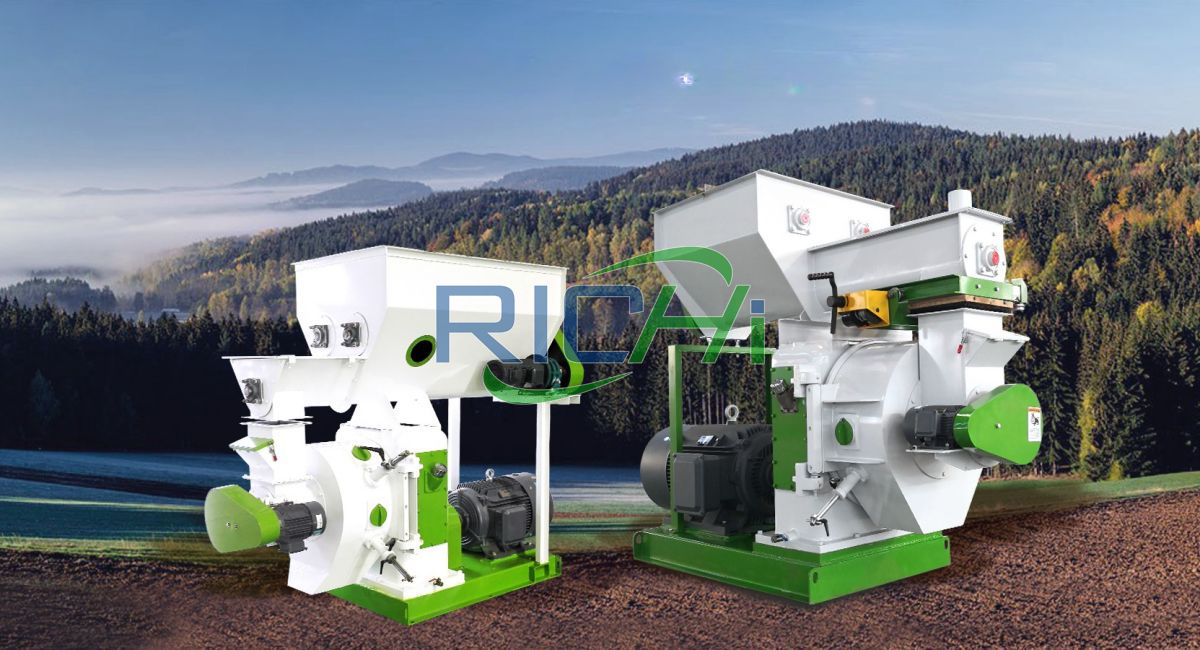
02 Ring Die Design Of Biofuel Pellet Machine
The ring die part is the key to the design of the biomass pellet press, which directly affects the quality of biomass pellet molding, production efficiency and service life of the ring die.
In the design of this biomass granulator machine, the ring die and the pressure roller rotate at the same time, the power comes from the same motor, and the relative movement of the two is realized through the reversing gear.
When the moving speed is too high, it will cause faults and increase of powder. When the speed is low, it will affect the production efficiency. According to the analysis of experimental data, it is more appropriate when the linear speed at the inner diameter of the ring die is 4-8m/s.
The die hole of the biomass pellet making machine ring die is mainly composed of three parts: the conical hole for material guide, the straight hole for maintaining pressure, and the hole for decompression and discharge.
The material guide cone is a funnel-shaped structure, which can make it easier for granular materials to enter the pressure-holding straight hole, which is the main part of the material compression molding. The form of die holes is designed and selected according to the characteristics of different biomass raw materials.
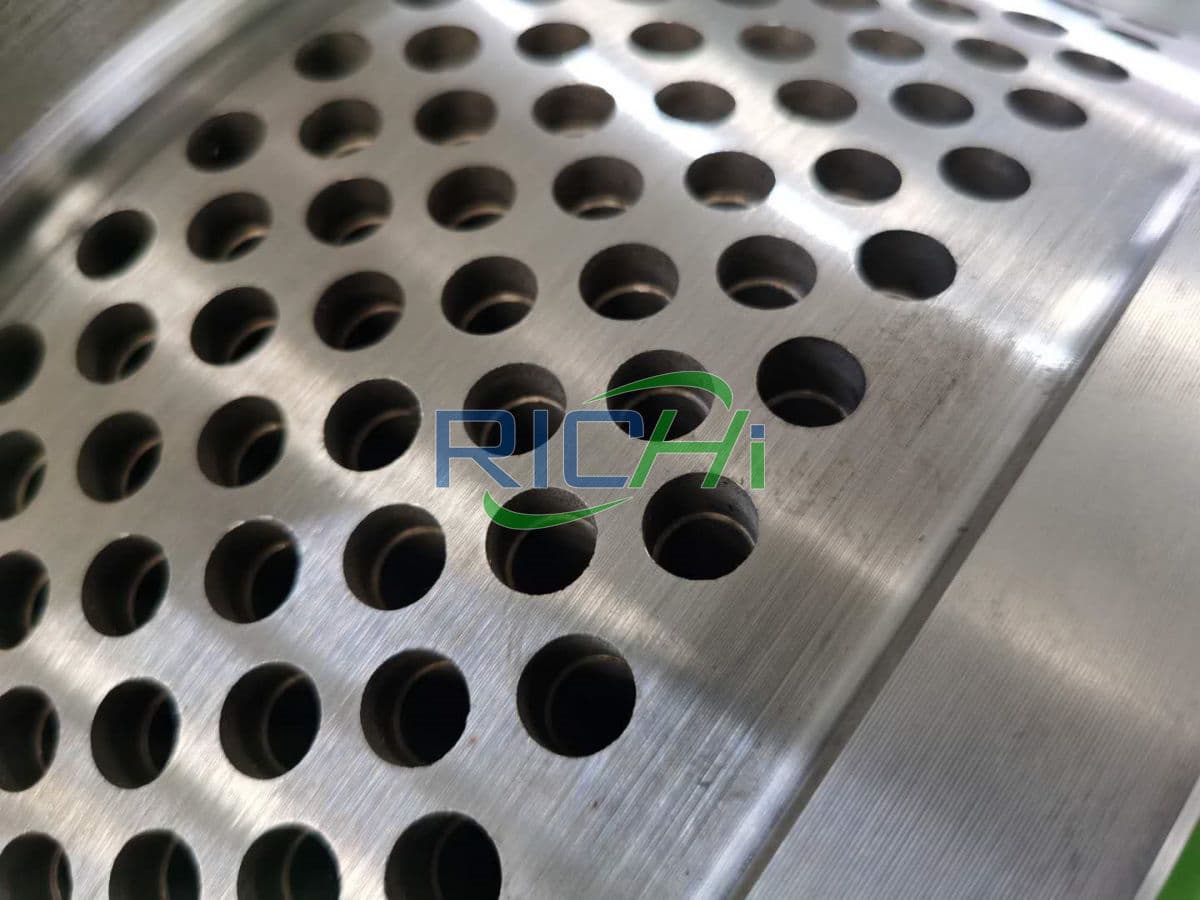
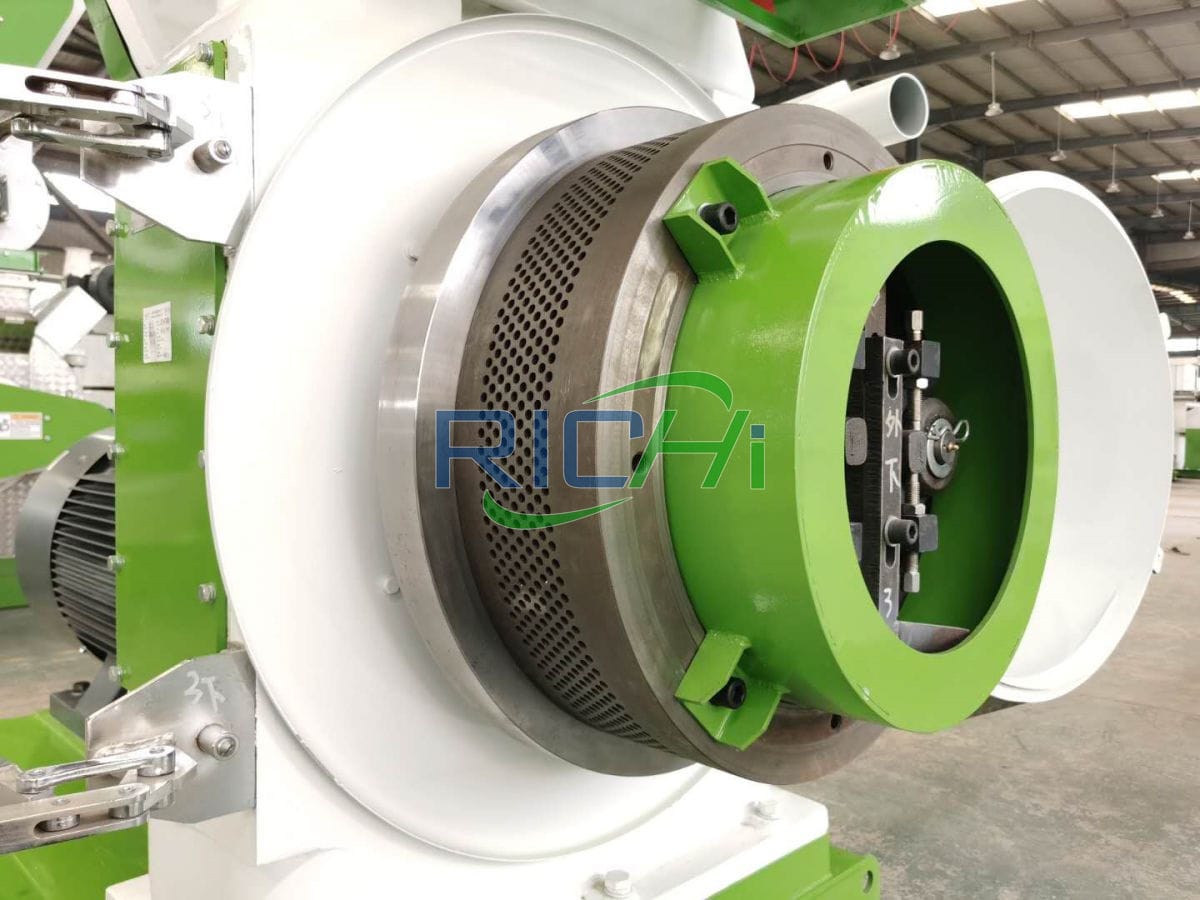
The material guide cone is a funnel-shaped structure, which can make it easier for granular materials to enter the pressure-holding straight hole, which is the main part of the material compression molding. The form of die holes is designed and selected according to the characteristics of different biomass raw materials.
The ratio of the effective length of the pressure-holding straight hole to its diameter is called the compression ratio, and the compression ratio is a parameter closely related to the density and strength of the pressed fuel particles.
The porosity of the ring die will affect the structural strength and production efficiency of the biomass pellet machine ring die. Usually, the porosity of the ring die of the biomass pellet mill machine is smaller than that of the feed. In order to ensure smooth discharge, the roughness of the inner wall of the die hole should be between 0.8 and 1.6.
Through the experiment with corn stalk as raw material, the final size of the die hole is determined as follows:
- the angle of the guide taper hole is 60°;
- the diameter of the straight hole is 6mm;
- the diameter of the pressure relief hole is 6.5mm;
- the length of the straight hole is 30mm;
- the inner diameter of the biomass pellet making machine ring die is 320mm;
- the width is 90mm;
- the compression ratio is 5, and the opening rate is 33%.
We specialize in the biomass pellet mill for sale. The traditional biomass pellet press has serious wear and tear when processing hard materials, so that the production cost is too high.
RICHI’s biomass granulator overcomes this shortcoming, and not only has high production efficiency, but also large output. Compared with the traditional biomass pellet mill system, the production cost per ton of biomass pellets is low, the investment cost of the whole system is low, and the payback period is short.
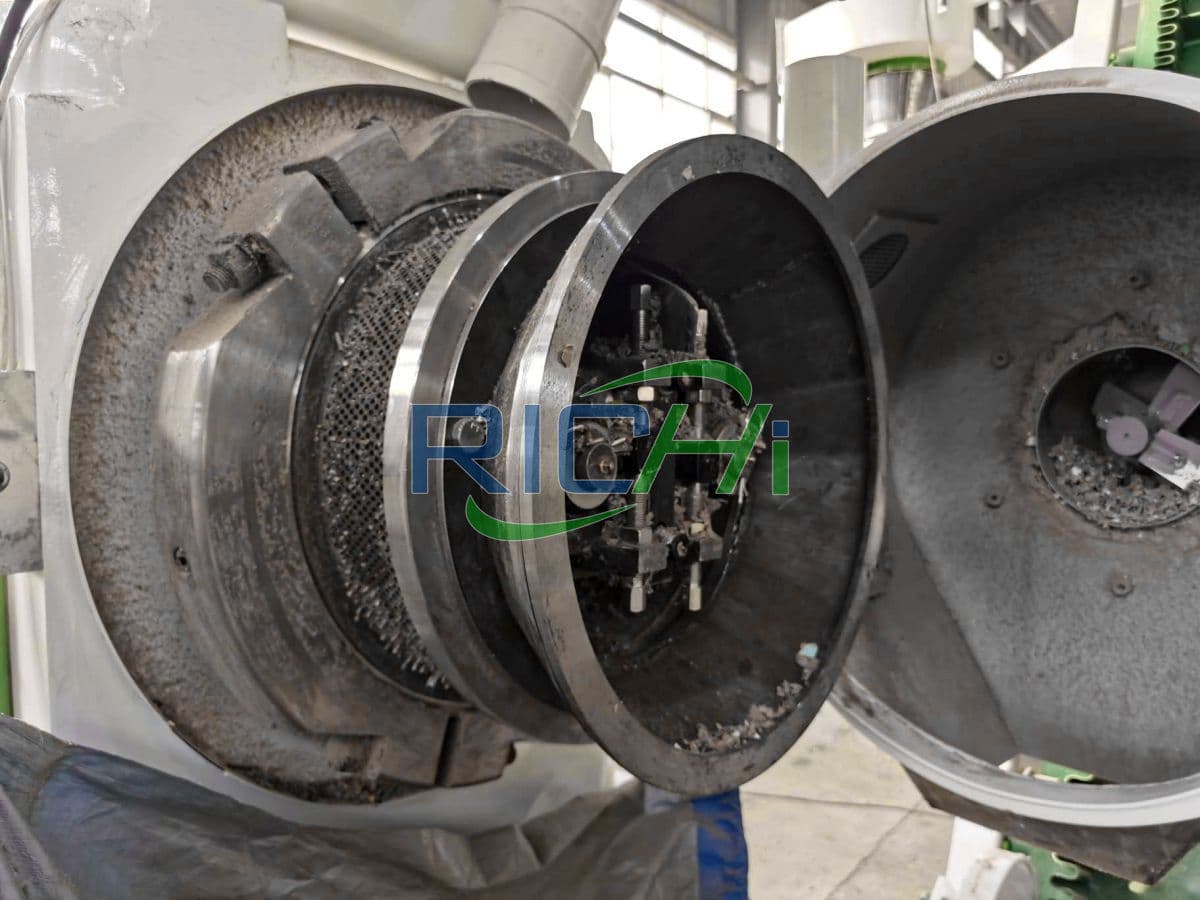
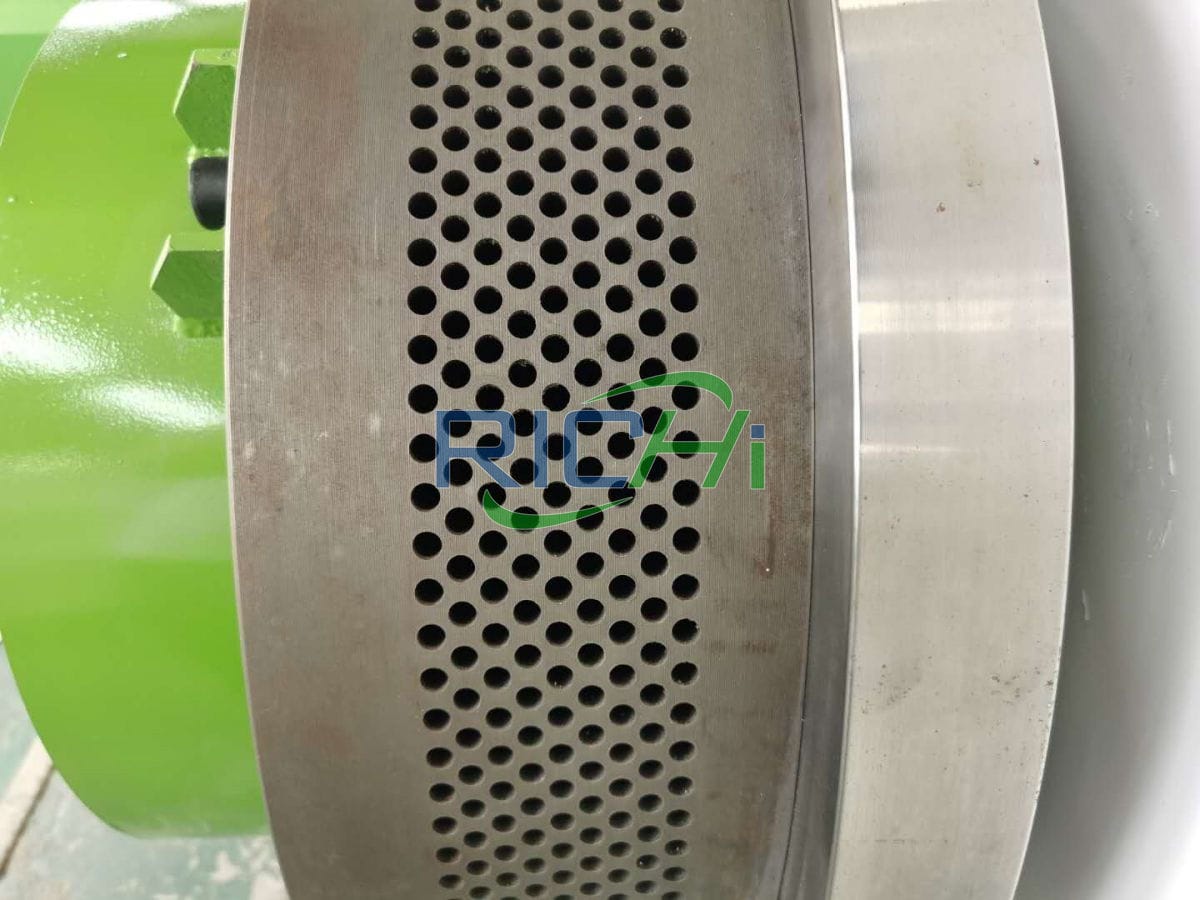
03 Roller Design Of Biomass Pellet Maker Machine
The pressing roller and the ring die are the core components of the biomass pellet machine, and they cooperate with each other to extrude the raw material to form fuel pellets.
The pressure roller is mainly composed of the pressure roller rotating body, bearing, pressure roller shaft, locking nut, dust cover and other parts.
The distance between the surface of the pressing roller of the biomass granulator and the inner surface of the ring die should be controlled between 0.1 and 0.3 mm.
If the distance is too small, it will easily cause friction and collision of parts or material interruption. If the distance is too large, the material layer will be too thick, which will affect extrusion molding. effect and yield.
The biomass pellet mill adopts the symmetrical layout of two pressing rollers, which can offset most of the reaction force generated by the pressing rollers, and the mechanism is more stable, reducing the vibration and noise of the biomass pellet making machine when it is working.
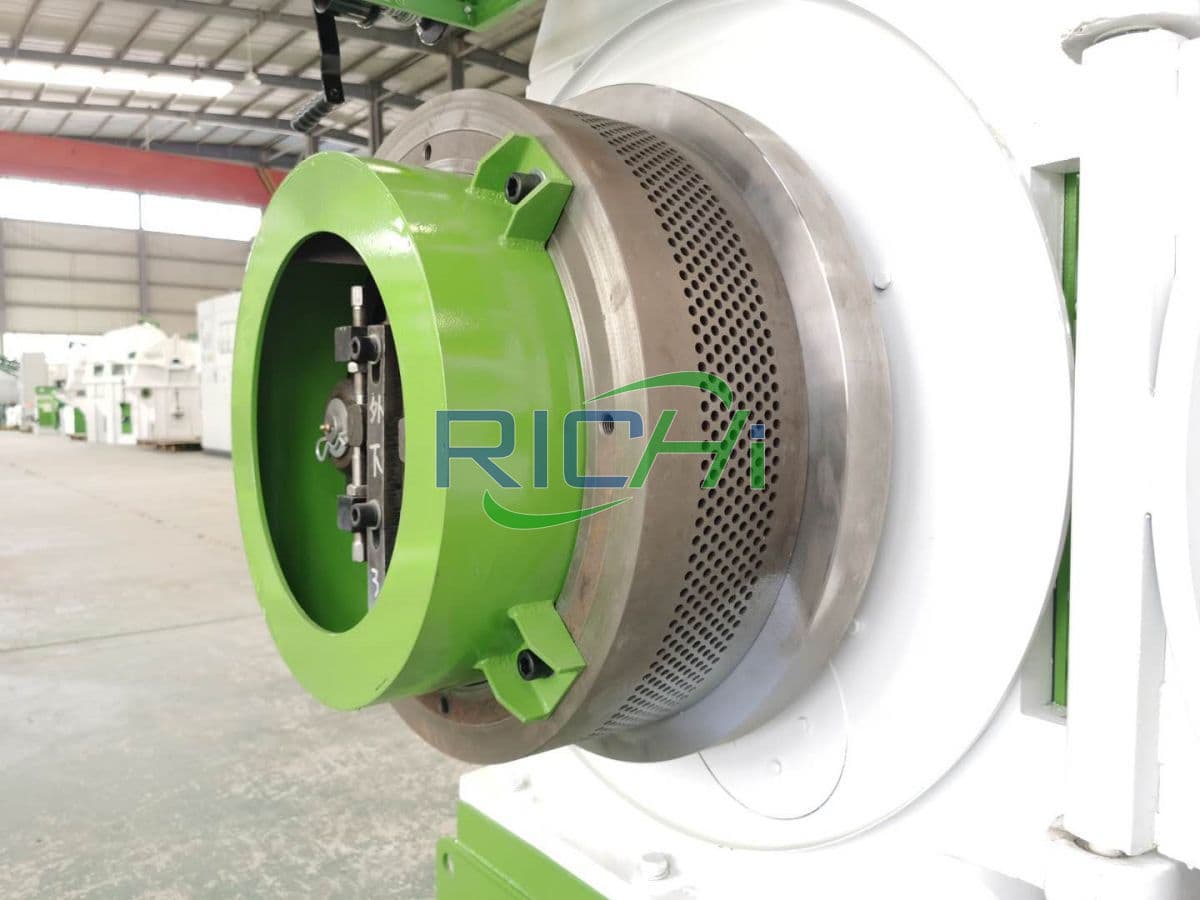
Note:
- The key technology of the biomass pellets machine is the cooperation between the feeding of the material and the extrusion molding, which must be “eat” and “spit”. Whether the material can be fed is the premise, and whether it can be extruded after feeding is the key.
- The factors that affect the feeding and extrusion molding include the physical shape of the powder, the radius of the biomass pellet maker pressing roller, the interval of the feeding scraper, the motor power, the rotational speed of the die roller, the gap between the biomass fuel pellet machine die and rollers, the moisture content of the material, the shape of the die hole, etc. Only these influencing factors can be achieved. Extrusion and forming can only be synchronized when they are harmonized.
Richi Machinery is mainly engaged in biomass pellet mill for sale, promoting the global strategy, cultivates an international business model, and has accumulated rich practical experience. The customer market covers six continents: Asia, Europe, Africa, North and South America and Oceania.
The Benefits Of Using Biomass Pellet Mill
Richi Machinery specialize in biomass pellet mill for sale, our biomass pellet mill is carefully designed for customers according to the actual requirements of customers, which fully reflects the rationality, effectiveness and applicability of the design, large processing capacity, low wear and operating costs. Low is its distinctive feature.
Richi Machinery can provide total solutions and EPC turnkey services to meet the different process requirements of customers.
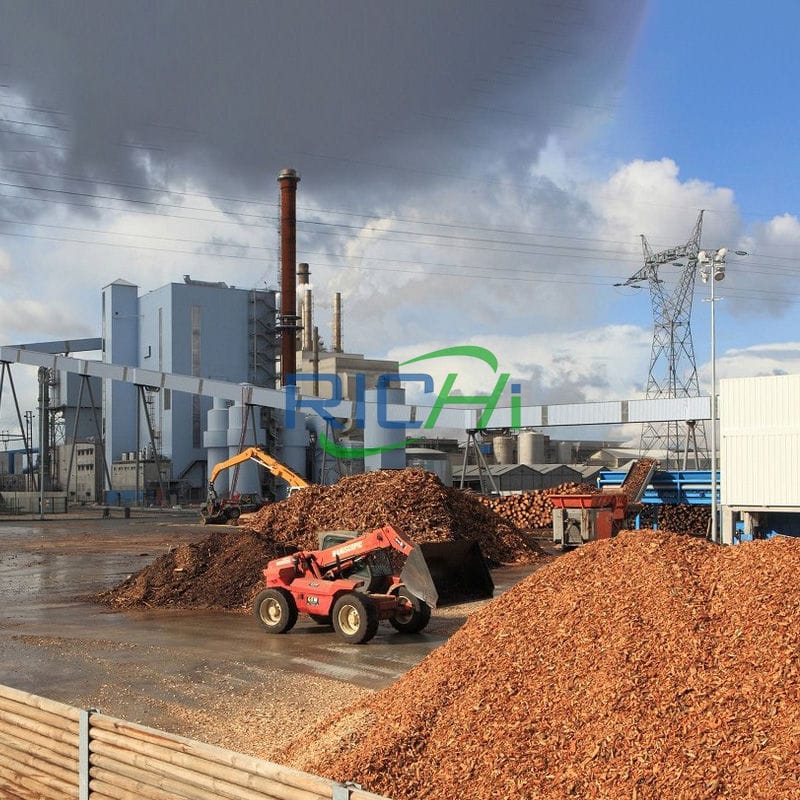
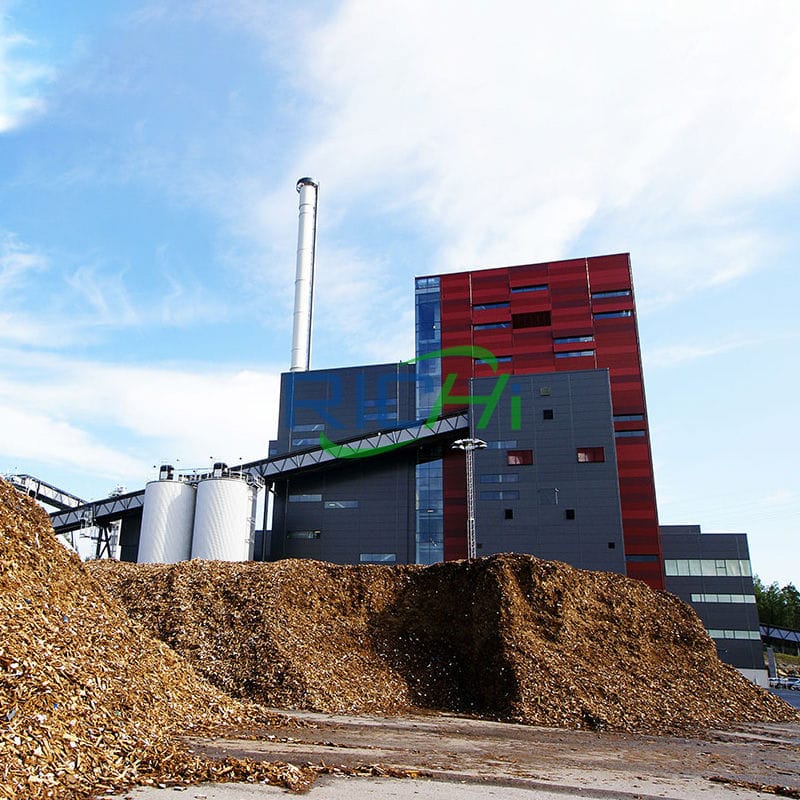
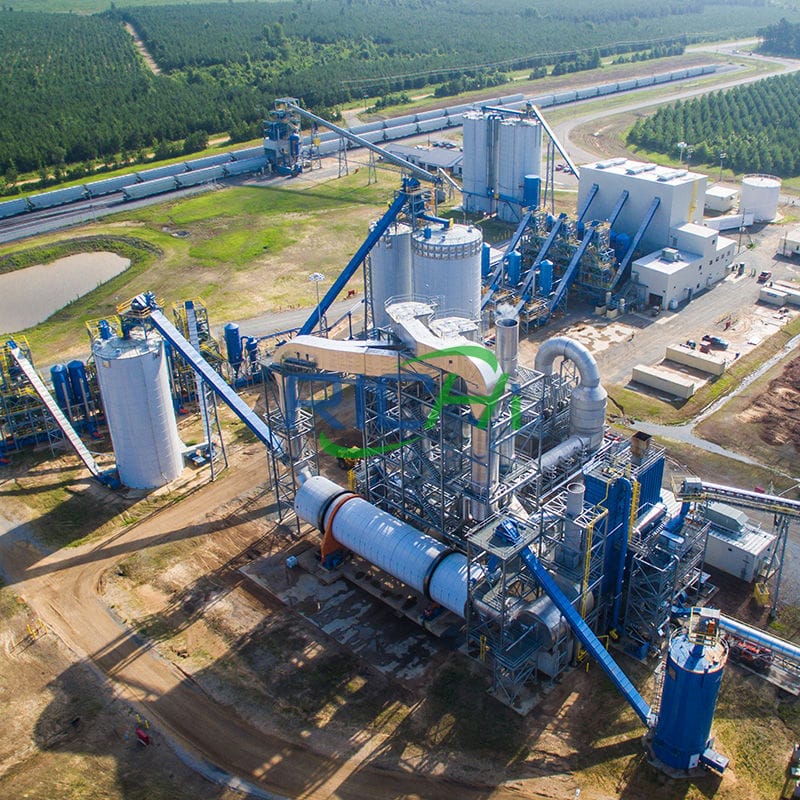
Compared With Other Molding Methods, The Use Of Ring Die Biofuel Pellet Machine To Press Biomass Pellets Has The Following Advantages:
- High production efficiency and low energy consumption, the large and medium-sized ring die biomass pellet making machine can produce more than 2 tons of finished pellets per hour, and the energy consumption is 56% to 33% of the energy consumption of heating and densification;
- The requirements for raw material pretreatment are low, and the moisture content can be formed by 10% to 18%;
- The wear of the forming die is small. Because it is formed at room temperature, the strength and wear resistance of the forming die will not be reduced, and the service life of the forming die will be longer;
- The calorific value of the pellet fuel basically does not change. The biomass raw material is formed at room temperature without destroying the molecular structure of the raw material, without any chemical reaction and any thermal cracking and differentiation. Therefore, the pellet fuel has almost no heat loss and can maintain the stable calorific value of the raw material.
It can be seen that the biomass pellet fuel manufacturing technology is developing in the direction of ring die biomass pellet maker with high efficiency, energy saving and low cost.
How To Choose Biomass Pellet Mill?
When you are looking for a biomass pellet machine manufacturer that has biomass pellet mill for sale, what aspects should you consider?
Advanced technology, economical application, high reliability, safety and durability, high process completeness, energy saving and environmental protection, economical and convenient maintenance, and high production efficiency.
At present, the most reliable structure is the ring die biomass pellet making machine, which can be selected according to the individual’s economic strength, straw resource status and production scale.
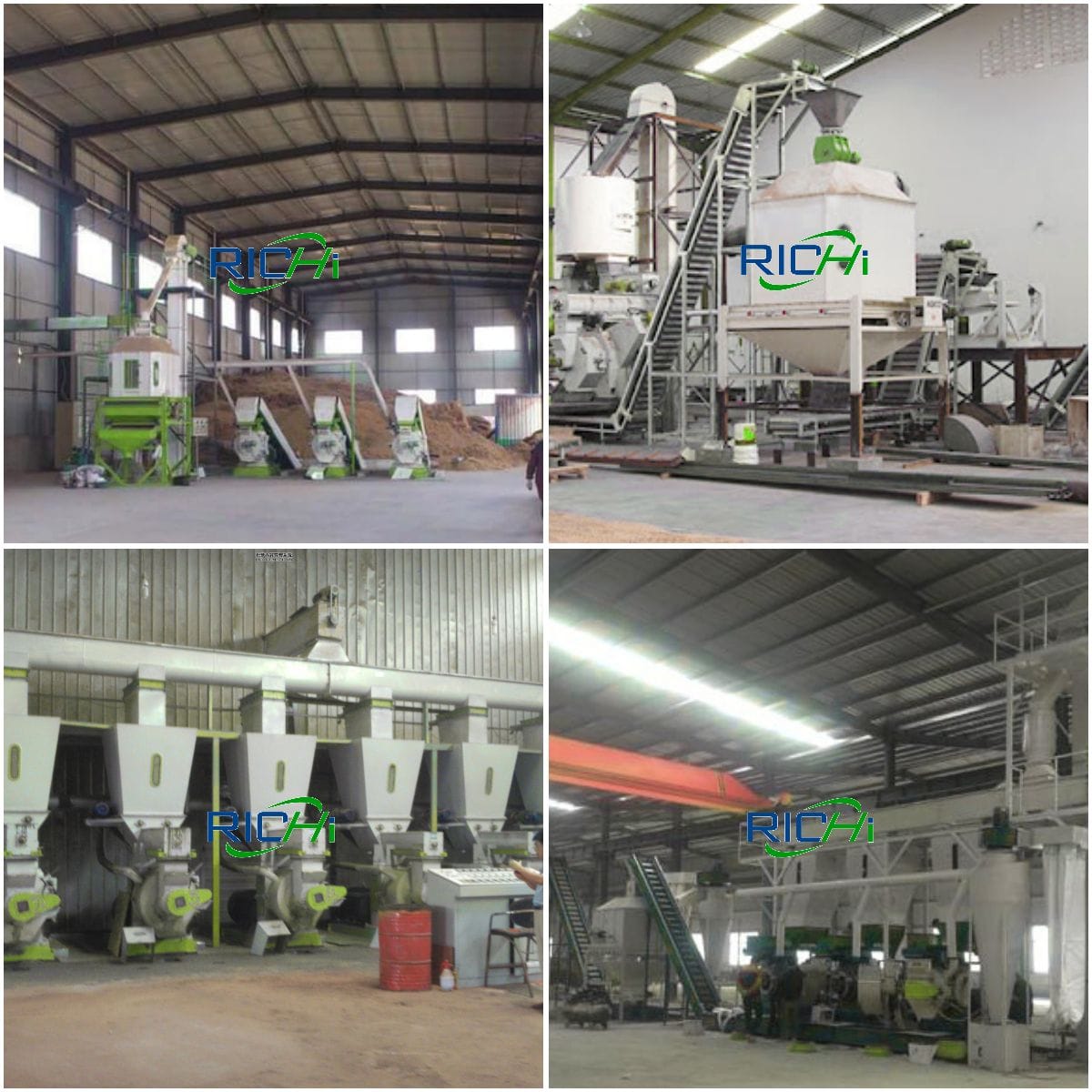
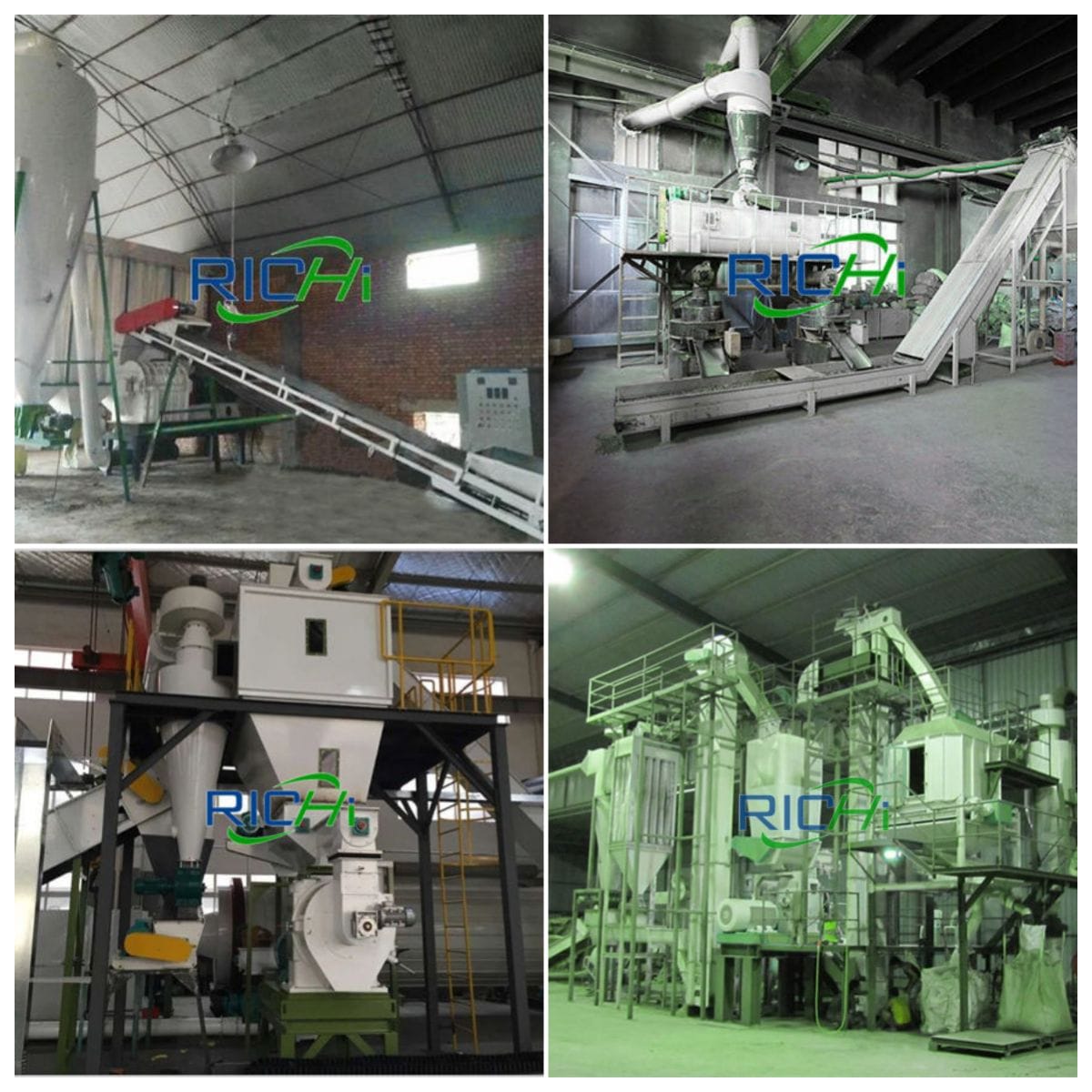
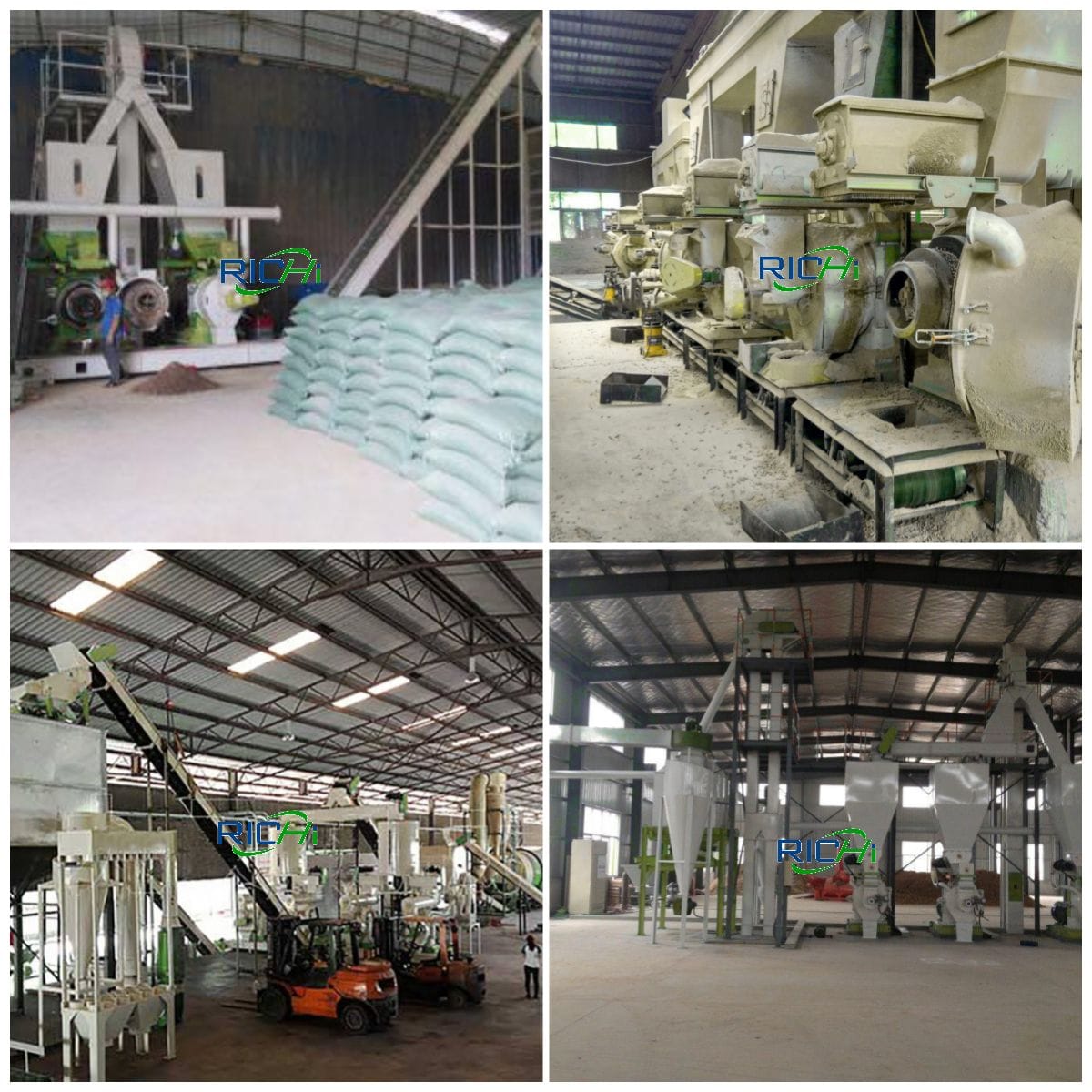
- Look for raw materials that can be directly made into pellets, such as branches, wood strips, wood scraps and other materials, preferably dry materials;
- After the raw materials are determined, it is necessary to determine the workshop. The construction or search of the workshop is generally close to the raw materials or a place with convenient transportation. It is the best to have both.
- Transformers, the biomass granulation industry consumes a lot of electricity. After determining the production capacity, choose to purchase a transformer that matches the production capacity according to the equipment power provided by the equipment manufacturer.
- Before purchasing the wood biomass pellet mill machine, you must first understand the product quality of the equipment manufacturer. It is often difficult to distinguish the quality of the product in the network environment. You must visit the manufacturer on the spot, and don’t be fooled by the low price. The centrifugal high-efficiency biomass pellet mill machine is the invention patent of our company, and it has now been upgraded to the 5th generation. The strong technical strength of Richi Machinery will escort your pellets.
For biomass pellet mill installation and debugging, our company will send technicians to guide the installation and debugging training for free.
Ring Die Biomass Pellet Machine VS Flat Die Biomass Pellet Mill
We have ring die biomass pellet mill for sale, also have flat die biomass pellet mill for sale, but how to choose the most suitable biomass pelletizer for your biomass pellet production?
Many people still compare the flat die pellet machine with ring die biomass pellet mill, but it is not necessary at all. Because their scope of application is different. In addition, if you process biomass pellets to create economic benefits, then a ring die biomass pellet maker that can process high-quality biomass pellets is your inevitable choice.
This principle is also applicable in the field of feed pellet processing, because high-quality feed pellets can create better feed rewards, which is the value. No matter if the flat die biomass energy machine manufacturer advocates this product, it is actually unnecessary to compare it with the ring die biomass pelletizer, because it is not at the same technical level.
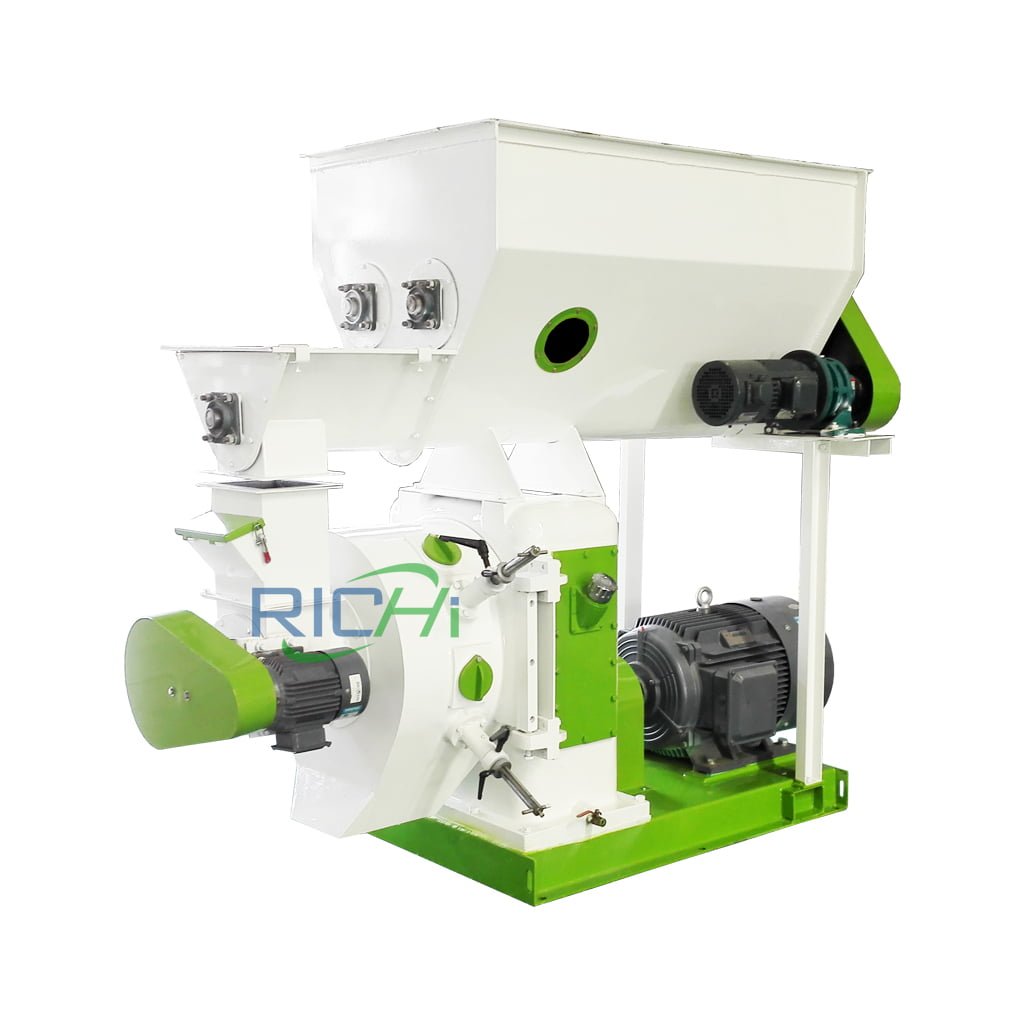
The ring die biomass pellet mill is characterized by large output, consistent pellet specifications, high density, up to 1.0 ~ 1.3 kg/m3, and pellets can be made without any additives; the pressure roller and ring die wear evenly, which can reduce product consumption; easy disassembly and assembly, simple maintenance. The disadvantage is that the power consumption is generally high.
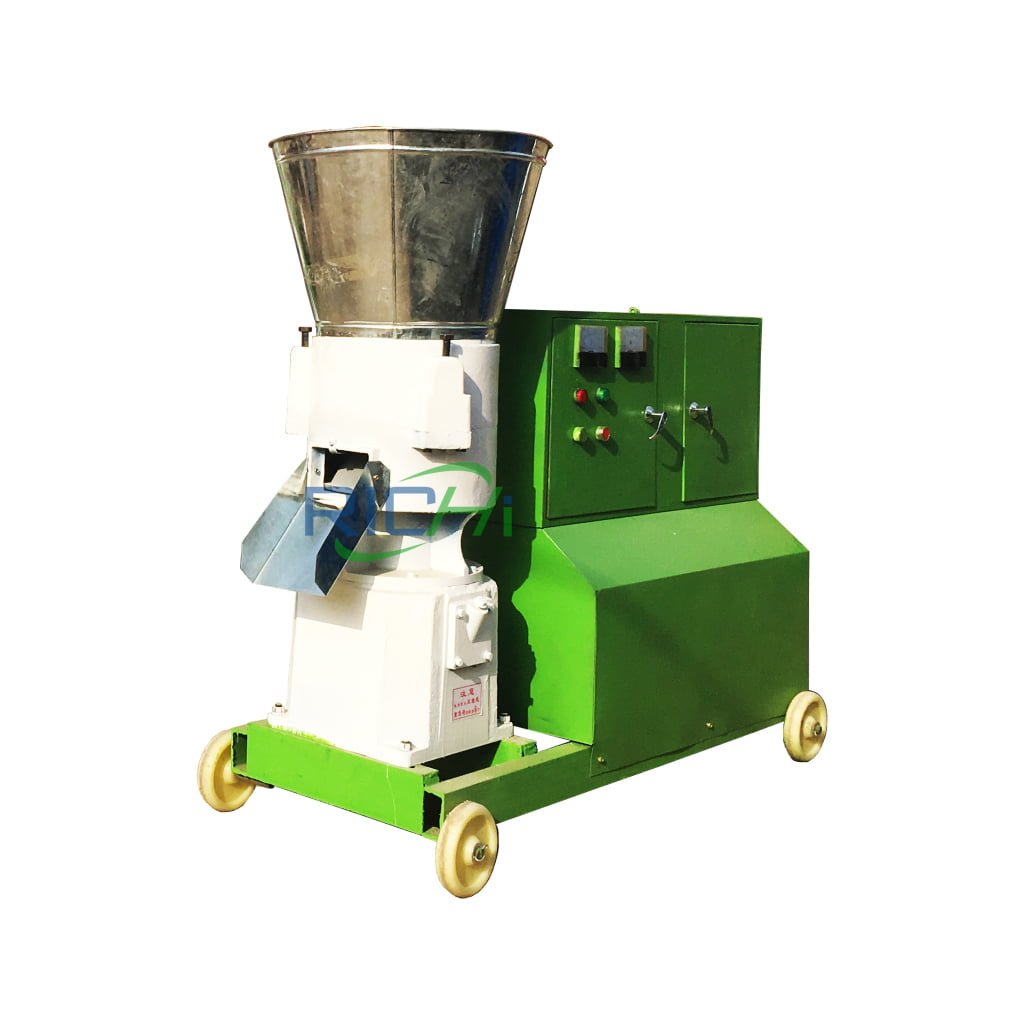
The advantages of flat die biomass pellet mill machines are that they consume less energy and have greater mobility. They are suitable for small-scale applications by rural residents, but not suitable for large-scale operations in biomass pellet mill factories and biomass pellet enterprises. The disadvantages are low output, low pressure and poor molding quality.
As a manufacturer focusing on the biomass pellet mill for sale, Richi Machinery firmly believes in being customer-oriented, creating value for customers, and realizing value sharing with customers.
It is not a simple verbal promise, but “considering customers as friends” and going deep into the market forefront, deeply understand the problems encountered by customers, and help customers achieve higher value returns.
The comparative analysis of the performance characteristics of the flat die biomass pellet mill machine and the ring die biomass pellet mill is shown in the following table.
After comparison, the biomass energy machine in the upper ring die can cooperate with auxiliary equipment to form continuous production, which is more suitable for large-scale automated production, with high production efficiency, low requirements for raw materials, low failure rate during equipment use, and convenient maintenance.
The flat die biomass pellet granulator has relatively small site requirements and is suitable for small-scale production, but has higher requirements for raw materials. Today, with industrialization and automation requirements, the ring die biomass pellet press will be more suitable for the needs of the market.
As a manufacturer focusing on the biomass pellet mill for sale, at the same time as a technologically innovative enterprise, Richi Machinery reinvest about 5% of our turnover into scientific research every year, continue to innovate in-depth machines, and use technology to interpret our strength. (Maybe you are interested in building a straw pellet plant)
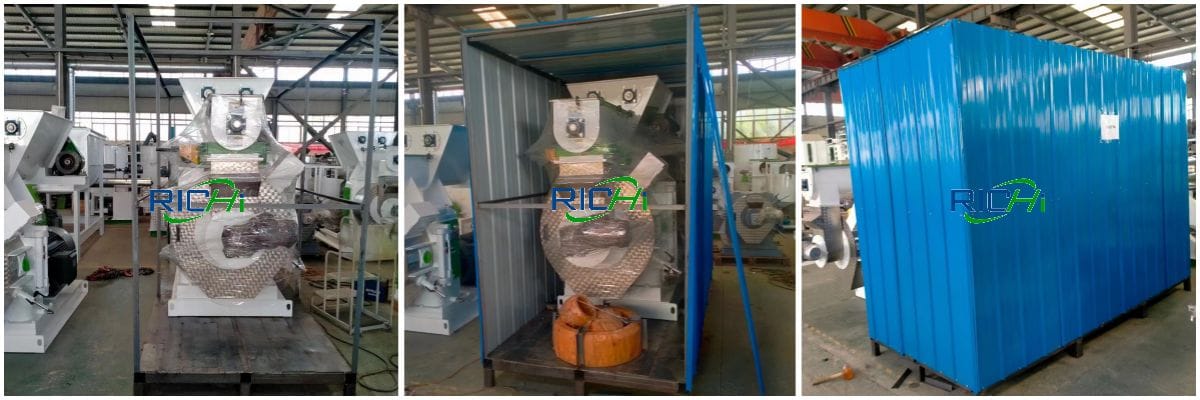
Our biomass granulator has been continuously improved in terms of granulation efficiency, processing capacity, reliability, particle shape optimization, energy consumption control, etc., so that its comprehensive performance is more excellent, and it can adapt to a variety of complex working conditions.
How To Build Biomass Pellet Production Line?
The biomass pellet press never works independently, and also needs a series of biomass pellet plant machine to assist, such as chipper machine, biomass hammer mill, dryers, slicers, packing scales, etc.
As a biomass pellet machine manufacturer, Richi Machinery can not only focuses on the biomass pellet mill for sale, but also undertake all biomass pellet production line stages design, budget, biomass pellet mill machinery and material procurement, construction, trial operation and acceptance of a complete biomass pellet production line system project, and finally submit a biomass pellet production line.
Project that meets the functions and conditions of use to the customer, and assumes full responsibility for the quality, progress and safety of the project.
Process Flow Of Biomass Pellet Production Line
The biomass pellet production line uses new technologies and special biomass energy machine to use agricultural and forestry wastes (such as wood, bark, sawdust, wood chips, walnut shells, flue-cured tobacco straw, corn cob, peanut shells, rubber seed shells, etc.) as raw materials, and the raw materials are recycled.
Raw materials crushing (powder length less than 5 mm) → Tempering (moisture content less than 15%) → Compression molding → Output cooling and drying → Packing and transportation and other processes of compression molding fuel, is the best substitute for coal, diesel, natural gas and other traditional energy sources, it is a renewable new type of clean energy.
The following are only common biomass pellet production line processes, and the specific biomass pellet production line process needs to be determined according to the actual situation. (Maybe you are interested in building a straw pelleting plant)
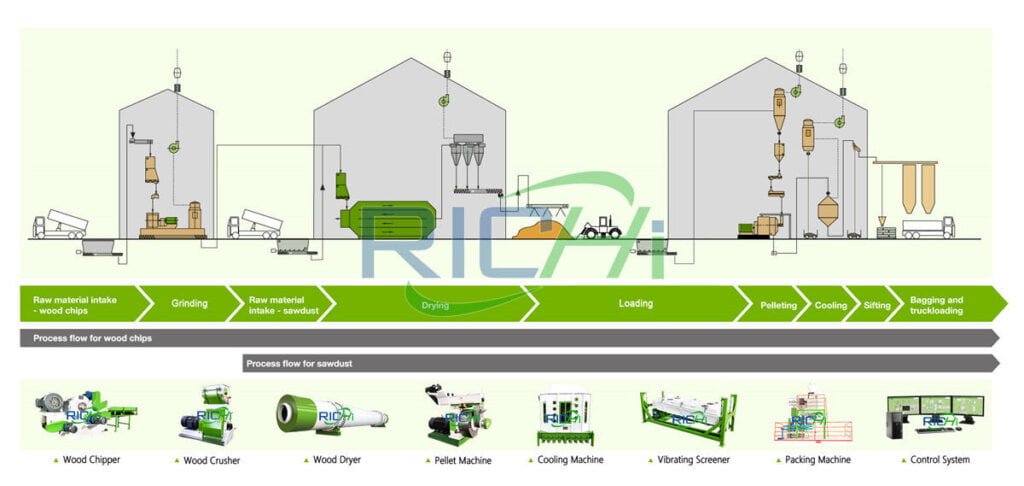
Chipping System:
The agricultural and forestry wastes are transported into the warehouse by the conveyor, sliced by the slicing machine and then entered into the wood chip warehouse, screened by the vibrating screen, and the uniform wood chips are screened out, and then enter the cleaning section.
Impurity Removal System:
The impurity removal system cleans the cut wood chips, removes mud, sand and other impurities contained in the wood chips and other biomass materials, ensures the purity of the biomass pellet fuel and improves the calorific value of the fuel.
Proportion:
Different raw materials are mixed in a certain proportion. (If the raw material is a single raw material, this section can be ignored. In addition, some raw materials need to be added with additives. If it is a raw material containing natural lignin such as wood, no additives need to be added.)
Drying System:
Drying by biomass materials dryer or hot blast stove, using high temperature flue gas as heating medium, the moisture control error is within 0.01, due to the precise control of fiber moisture, the quality and output of biomass pellet fuel are guaranteed.
Crushing System:
The raw materials are fully pulverized by the pulverizing system, which is convenient for the next step of granulation. The crushing process is not necessary and does not have to be after the drying system, which depends on the demand for raw materials and finished products.
Granulation/Cooling/Packing System:
The crushed raw materials are sent to biomass pellet mill for granulation. The finished pellets will enter the cooler for cooling and then be screened. Qualified pellets enter the packaging machine for bagging, and unqualified biomass pellets will be re-granulated.
Richi Machinery not only focuses on the biomass pellet mill for sale, but also have more than 25 years of experience in biomass pellet plant design. Richi Machinery’s biomass pellet production line project has become more mature after nearly two years of operation.
The services we can provide include technical assistance in the entire process of pellet production line design, site planning, and process plans. The project manager is responsible for unified tracking, making the project progress and cost input more clear.
The Main Components Of The Biomass Pellet Production Line
01 Chipping System
The raw materials of various specifications are first processed by a chipper to make wood chips with a size of less than 30×20×5 mm, which is convenient for the subsequent feeding of the biomass grinding machine and improves the pulverization efficiency.
(The processing methods of different raw materials before entering the biomass pellet making machine are quite different)
02 Crushing System
The wood chips processed by the chipping system are transported to the crushing system, and after removing iron and impurities, they are crushed to less than 5 mm by the crusher, and then transported to the drying system.
03 Drying System
The level of raw material moisture directly affects the quality and output of biomass briquette fuel. High moisture content leads to poor molding of biomass pellets; low moisture content leads to difficulty in molding, large friction, serious equipment wear and low output.
Therefore, the raw materials must be dried to control the moisture in the most suitable range for granulation.
04 Pelletizing System
Pelletizing principle of the biomass pellet : The raw materials used in biomass compression molding are various agricultural and forestry wastes such as wood, sawdust, sawdust, fruit shells, and straw.
These biomass cells contain a large amount of cellulose, hemicellulose and lignin, accounting for more than 2/3 of the plant body composition.
When the temperature reaches 70-110℃, the lignin softens and the cohesion increases; when the temperature reaches 200-300℃, the softening degree intensifies.
Since the inelastic or viscoelastic fiber molecules are entangled and twisted with each other, they will not return to their original structural shape after the external pressure is removed.
As a manufacturer focusing on the biomass pellet mill for sale, more than 25 years of experience in biomass pellet mill and biomass pellet plant production, design and installation, and feedback from thousands of domestic and foreign customers are the basis and guarantee of our process design.
Scientific and reasonable process planning is the decisive factor for the production of high-quality products, which can not only improve production efficiency but also reduce production costs.
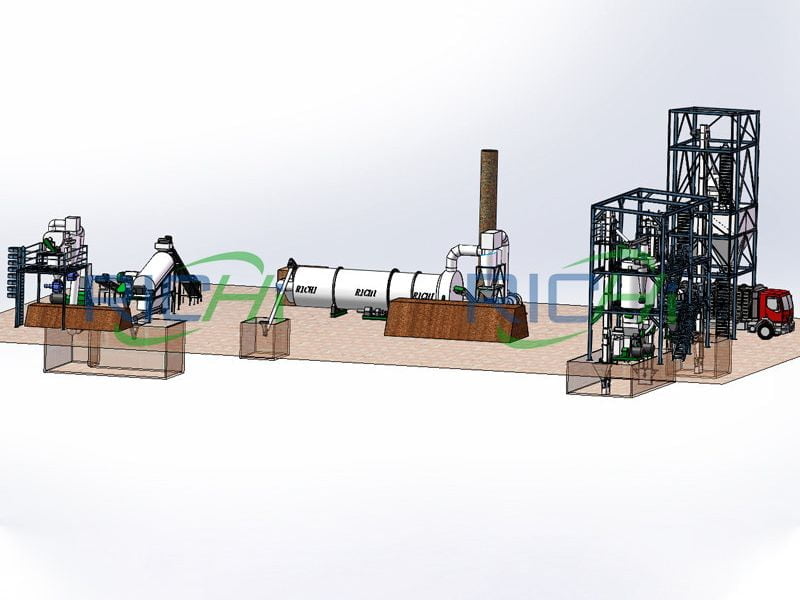
1-1.5T/H biomass pellet production line
Richi Machinery has been closely following the trend of modern industrial design and the general development trend, and constantly innovating and developing new processes and new equipment. We will customize scientific and reasonable production processes for you according to your materials, output, plant site and other factors.
Starting Your Biomass Pellet Production With Richi Machinery
The production of pellets from loose biomass at room temperature is the most direct and easiest way to utilize biomass energy. In recent years, the production of biomass pellet fuel has attracted great attention and extensive attention.
The development plans and related policies of the renewable energy industry in many countries have played a huge role in promoting the popularization and application of biomass pellet fuel. The key to producing biomass pellet fuel is to have biomass pellets making machine with good performance and simple operation.
With the rapid development of the actual economy, the demand for energy is increasing day by day, and each country produces a large amount of biomass raw materials every year, and the quality biomass pellet has broad prospects for development.
Long-term exchanges and cooperation with overseas countries have not only kept the company’s products at an international high level, but also won a wide range of international markets. (Maybe you are interested in building a wood pellet production plant)
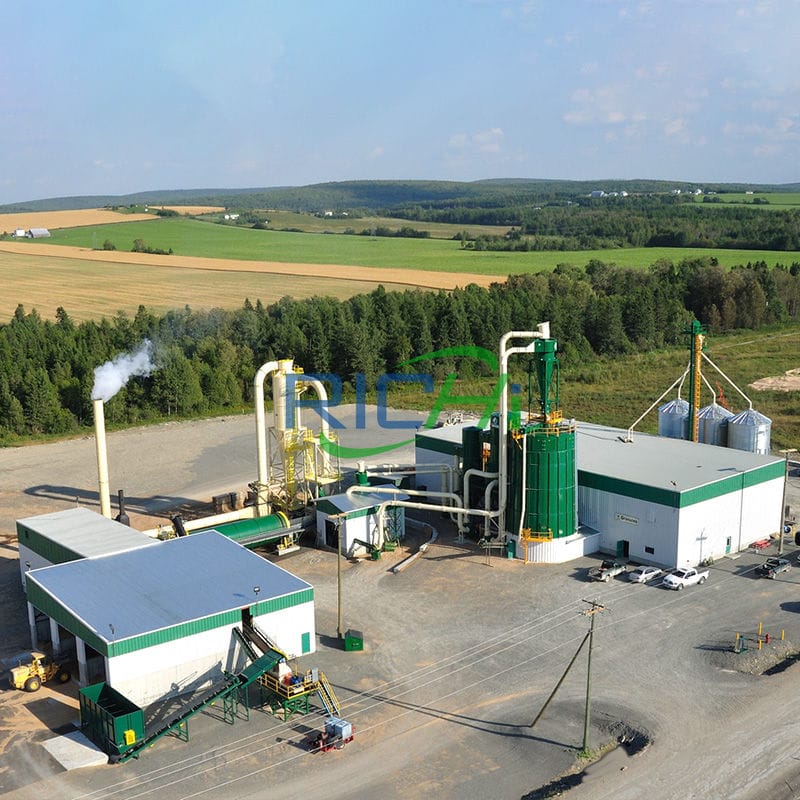
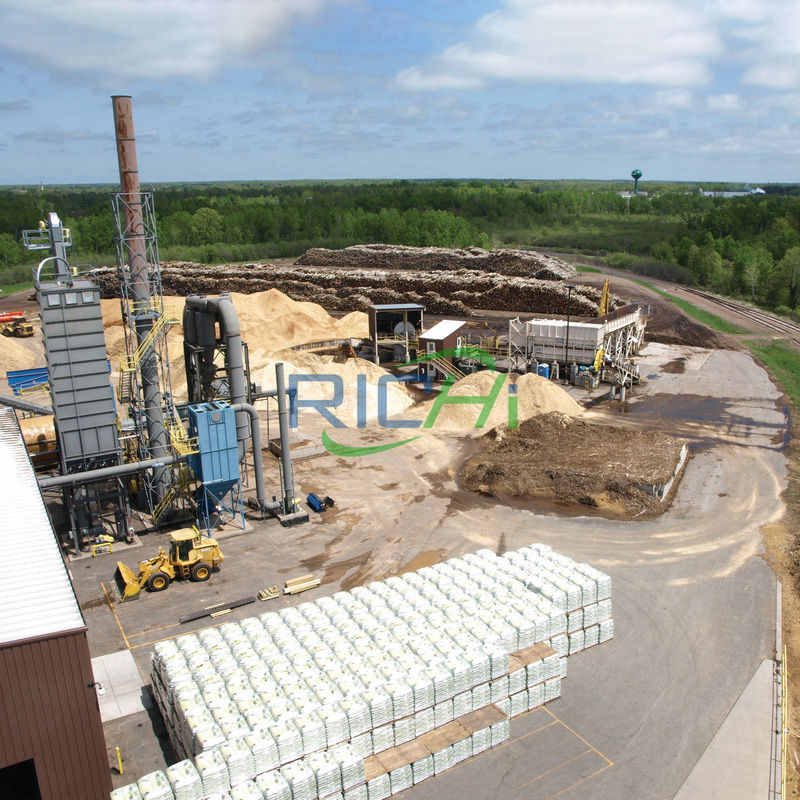
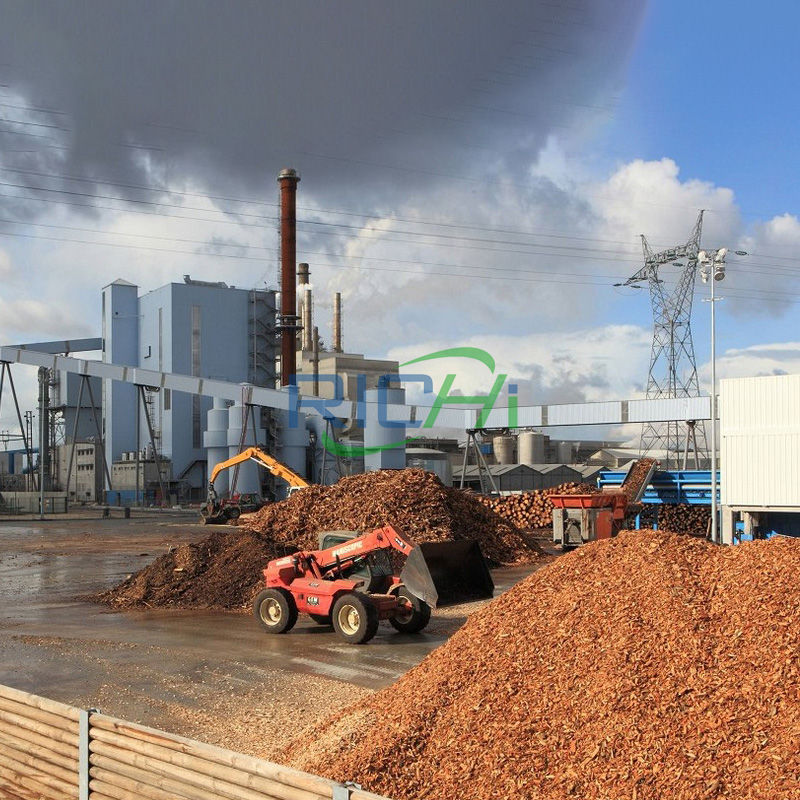
01 Personalized Customization & Provide 3D Renderings
We can design wood pellet plant project planning schemes according to the different needs of customers, and provide 3D renderings to enhance the user experience. Help customers to accurately sort out their own needs, repeatedly scrutinize the rationality and scientificity of the process with customers, try to optimize the design of the product system, and meet customers’ reasonable personalized needs at all costs.
With perfectionism and ingenuity, we create a turnkey pellet plant project, seek our own value for our customers, and use the ‘differentiated competitive strategy’ to improve our market competitiveness for our customers, so as to achieve strong alliances and common development.
02 On-The-Spot Investigation & Adapting Measures To Local Conditions
We design comprehensive problem solutions for biomass pellet plant engineering according to different requirements of customers, different raw materials, and different sites. Our professionals go deep into the construction site and do a good job of planning.
In practice, we can truly adjust measures to local conditions, and adopt different design schemes and construction methods according to different survey results to ensure that it is scientific and reasonable, economical and practical, and meets environmental protection. So as to create a safe, efficient and stable biofuel pellet plant for customers.
03 Professional Team & On-Site Installation
Richi Machinery has a professional technical team with 25 years of practical experience in design, manufacture and installation. Unified management and unified training. Strict technical assessment is carried out every year, and it has rich on-site installation and maintenance experience, professional quality and high sense of responsibility.
With a high degree of professionalism, we help customers to quickly put into production and achieve production benefits, allowing customers to seize market opportunities and win at the starting line.
04 Technical Service & Whole Process Guarantee
Whether in pre-sale or after-sale technical support, we are always ready to provide customer satisfaction services. To ensure the highest work efficiency in a rigorous order, 24-hour reception of customers’ technical inquiries, on-site service, equipment maintenance, production failures, service complaints and a series of problems to improve customer satisfaction.
Through telephone consultation and door-to-door service, we can find and solve problems in a timely manner to ensure the rights and interests of customers. Provide professional and targeted services for different users, and escort customers throughout the process. (Maybe you are interested in building a wood pellet processing plant)
05 One-To-One Guidance & Worry-Free Production
After the installation and commissioning is completed, we will provide one-to-one technical guidance according to the actual situation of the customer, and be responsible for training the operators until the customer can fully operate the biomass pellet plant and pellet machine production by himself. Truly ‘customer-centric’, to provide customers with excellent service.
Follow-up questions will be answered by professionals, and feedback will be recorded in a timely manner, and solutions will be provided. If there is a need for on-site guidance, Richi Machinery will arrange relevant professionals to provide timely guidance at the designated location according to the specific circumstances.
06 Quick Response & Lifetime Maintenance
In terms of service quality control, we insist on life-long service and infinite improvement. In addition to the warranty period, we provide customers with life-long service. As long as the equipment is in use, RICHI’s service to customers will not be terminated. In the service, we insist on the first response and the fastest speed to solve the problem.
At the same time, a product dynamic improvement system is established. After solving the typical problems reported by customers, the biomass wood pellet plant or pellet plant machine design will be improved immediately, and the product will be continuously improved. For the problems in the service process, the RICHI service process will be improved and optimized immediately after they are solved.
Richi Machinery has lots of projects biomass pellet mill for sale Russia, Kazakhstan, Azerbaijan, Turkey, Kuwait, Algeria, Saudi Arabia, Congo, Angola, South Africa , Egypt, Vietnam, Malaysia, Indonesia, India, the United States, Canada, Mexico, Brazil, Chile, Australia and other 130 countries and regions.
FAQs Of Biomass Pellet Mill
How To Make High Quality Biomass Pellets?
High quality biomass pellets need high quality biomass pellet mill, but some factors are influencing the formation quality of biomass pellet mill:
01 Moisture
Moisture content is the most important factor affecting the quality of pellet fuel made by biomass pellet press. There is an appropriate amount of bound water and free water in the biological body, which has the function of lubricant, which reduces the friction between pellets and between the pellets and the inner wall of the mold, and enhances the fluidity, thereby promoting the sliding and fitting of the pellets under the action of biomass pellet mill pressure.
Moisture plays a significant role as a binder in the biomass pellet mill machine pelletizing process and affects the mechanical durability and strength of pellet fuels. The optimum moisture content varies with raw materials and biomass pellet mill production settings.
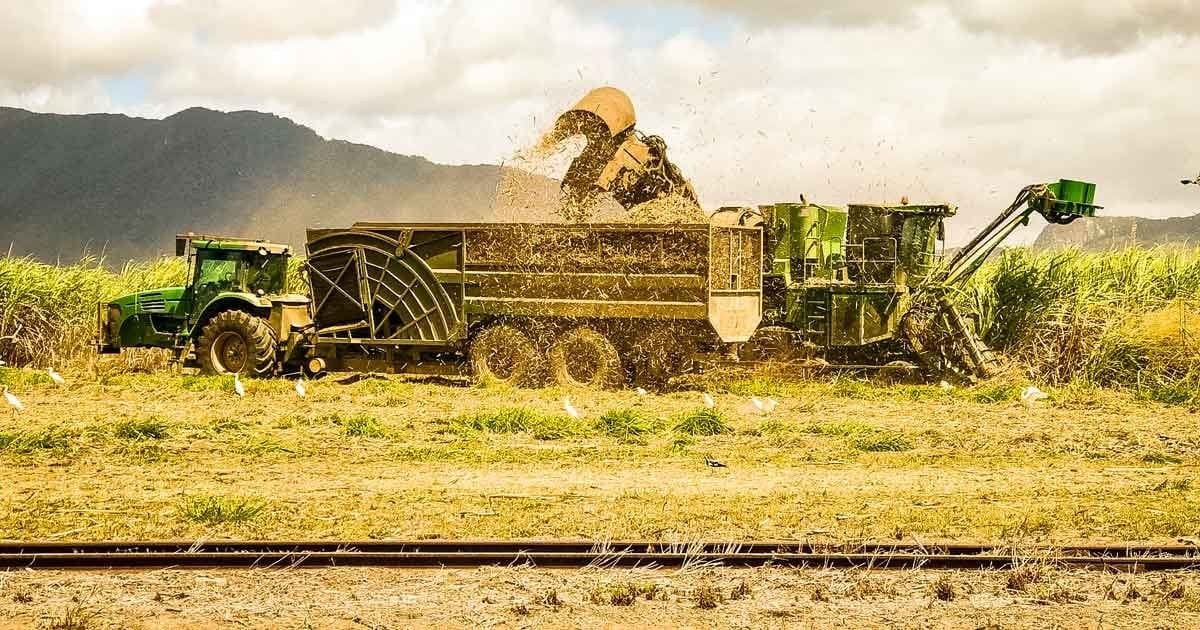
Pellet fuel intensity
Data from factory biomass pellet fuel production indicate that the strength and durability of dense wood pellets increase with increasing moisture content, up to an optimum value. At the same molding pressure, materials with high moisture content have lower porosity, resulting in a larger bond area and higher strength pellets produced.
When the water content is lower than the optimal water content, the increase of the bonding area is greater than the decrease of the bonding strength with the increase of the water content, and finally the strength of the pellet fuel increases; however, with the further increase of the water content, the bonding strength greatly increases. This effect predominates and outweighs the effect of the increased bond area on the strength of the pellet fuel, resulting in a decrease in the strength of the pellet fuel.
As a manufacturer focusing on the biomass pellet mill for sale,the turnkey biomass pellet mill solution is the answer submitted by Richi Machinery under the new situation of the biomass pellet processing industry, and it also coincides with the future development trend of the industry.
From the initial planning, design, production, installation to commissioning and operation of the biomass pellet machine project, the project contractor is directly involved in the project, which can realize the project general contracting service with full control of each link.
This service can not only ensure the strict matching and implementation of the design scheme and biomass pellet plant process, improve the quality of the project, greatly shorten the construction period, but also effectively reduce the customer’s cost and achieve a win-win situation between the customer and the biomass pellet mill manufacturers.
Density
Appropriate moisture content is beneficial to reduce the friction between pellets to eliminate pores, so moisture increases the mass of the pellets without increasing the volume, thereby increasing the density of the biomass pellet made by biomass pellets machine.
However, when the moisture content exceeds the optimum moisture content, since more moisture in the raw material is extruded and distributed between the particle layers, the pellet layers cannot be closely attached, which increases the resistance when the biomass pellet is pressed, and the excess moisture occupies volume, resulting in reduced strength and density of pellet fuel.
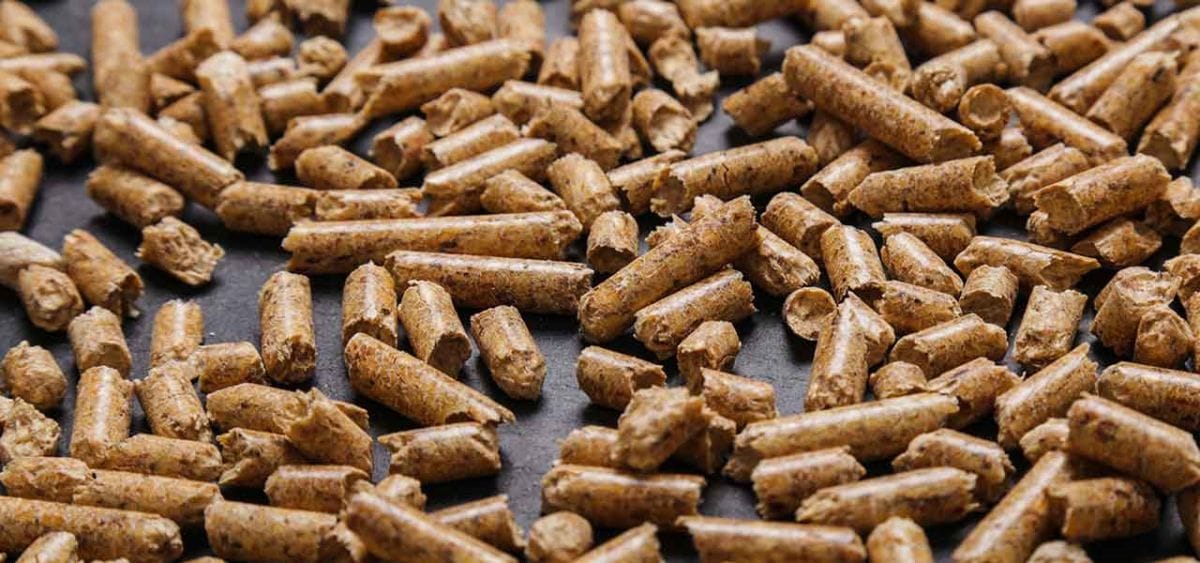
In addition, due to the incompressibility of moisture, it may prevent full compression and the release of natural binders in the pellets, resulting in failure of pellet fuel to form by biomass pellet mill. When the moisture content of the biomass raw material is too low, the particles cannot be fully extended, and the surrounding particles are not tightly combined, so they cannot be formed by biomass pellet making machine.
Regarding the molding of corn stalks, rice husks, sawdust, reeds and bean stalks, with the increase of the moisture content of the raw materials, the density of the pellet fuel increases, and when it reaches a certain suitable moisture content range, the density of the pellet fuel reaches the maximum, and remain relatively stable; when the moisture content of the raw material increases to a certain level, the density of the pellet fuel begins to decrease, which eventually leads to the inability to form.
When the moisture content is about 12%, the forming density is the largest, and the density change rate is the smallest. When the moisture content of the raw material is in the range of 8% to 15%, an ideal forming density can be obtained.
Richi Machinery specialize in biomass pellet mill for sale, according to the resource characteristics of different countries and regions, on-site operating environment and climatic conditions, to provide corresponding customized solutions for product and production line design, so that customers have more protection in comprehensive investment.
In the development of our business, we also put the ecological environment in the first place, starting from the aspects of reducing energy consumption and improving resource utilization, to ensure that the local environment is not affected and destroyed, and has won more trust from customers.
Adhesive strength
Moisture acts as a bridge at the effective sites between particles, thereby increasing the bond strength between these particles. When the water content is too low, the pores cannot be filled, water molecules cannot act as bridges, and the bonding strength is weak; on the other hand, when the water content is too high, the water absorbs hydrogen bond sites and occupies the space between the particle fuels. Adhesion sites, resulting in a decrease in bond strength.
In order to produce stable and durable pellet fuels by biomass pellet mill, the raw materials need to have an optimum moisture content. When using biomass such as corn stalks and reeds as raw materials for the production of pellet fuel, the moisture content of the raw materials should be kept at 12% to 18%, and the optimum moisture content is 15%.
When processing forestry residue pellets by biomass pelletizer, the moisture content of the raw material is 16%-22%, the molding pressure is 49-98 MPa, and the molding temperature is about 100 ℃, the molding effect is better.
The best quality wood pellet fuel made by biomass pelletizer is produced from red pine when the storage time is more than 120 days and the moisture content of the sawdust is in the range of 11% to 13%. When the moisture content of biomass raw materials is between 8% and 12%, high-quality wood pellet fuel is produced. Too high or too low moisture content will reduce the quality of pellet fuel.
In general, users choose different biomass pellet machine manufacturers’ equipment and corresponding power and required ring die processing area according to their own production capacity and product types. Richi Machinery specialize in biomass pellet mill for sale.
We carefully design for the customer according to the on-site investigation situation or the actual needs of the customer, which fully reflects the rationality, effectiveness and applicability of the entire biomass pellet mill system.
Strong technical strength and perfect service system are the guarantee for customers to purchase and use with confidence.
02 Extract
Pellet fuel made by biomass pellet mill is also affected by extractive content. Extracts are substances that can be extracted from wood by organic solvents, including low molecular weight compounds such as fatty acids, waxes, sterols, and terpenes. When the wood is first cut, these chemicals accumulate on the surface of the wood, preventing the wood molecules from binding, a phenomenon called passivation.
A comparative study of unextracted and acetone-extracted red pine wood pellets found that the wood pellet fuel produced from the extracted sawdust was higher in density and compressive strength than the pellet fuel produced from the untreated sawdust. The strength of pellet fuel may be closely related to the content of extractives.
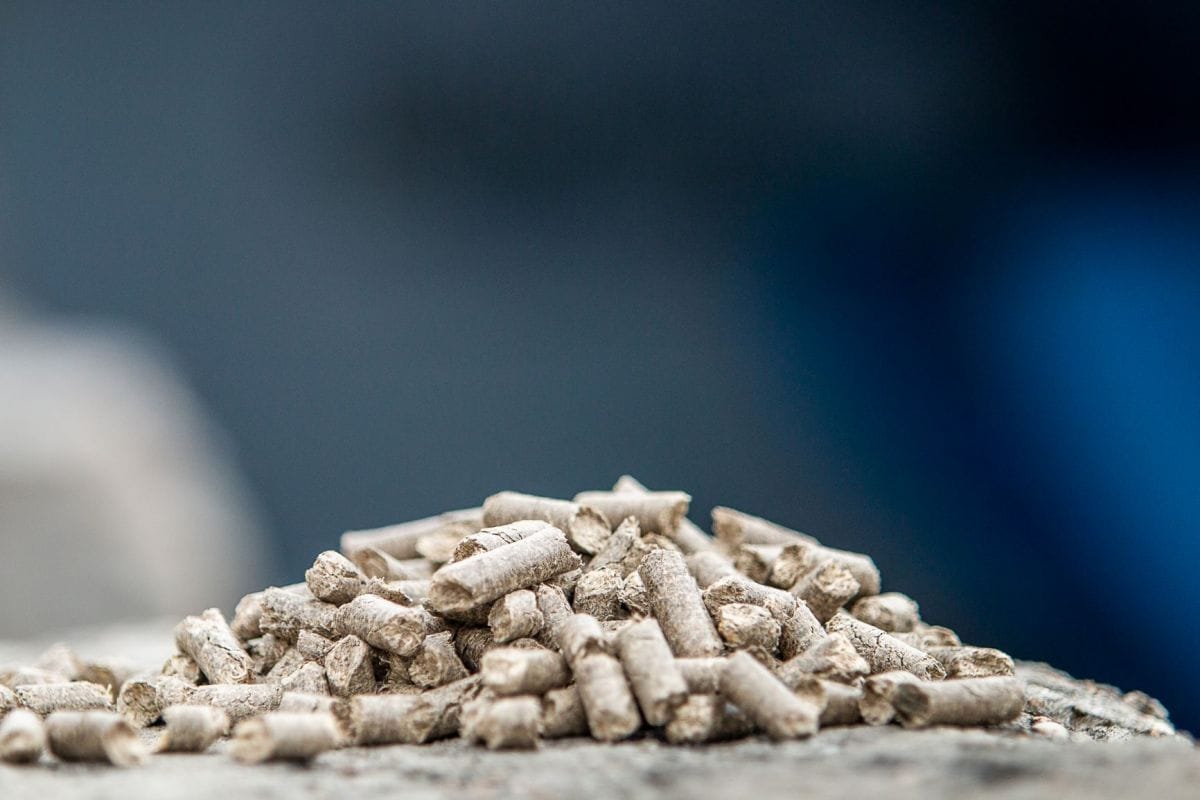
When the content of extractives increases, the strength of pellet fuels decreases significantly, because the extracts hinder the contact between the bonding points between the pellet fuels and the binding of moisture between the pellet fuels. decrease in strength.
The ultimate pursuit of technology is reflected in every customer site. Richi Machinery specialize in biomass pellet mill for sale, and attaches great importance to after-sales service, high standard requirements, multi-index tracking, to ensure timely feedback and effective solutions to problems at the first site; training and guidance for site operators, one-to-one solve problems in the process (operation, maintenance, troubleshooting, etc.)
Collect the actual operation data of the equipment and finished material samples, and understand the actual processing of the equipment, so as to provide corresponding data reference for the later development and design of the biomass granulator.
03 Production Factors Of The Biomass Pellet Mill
Production factors such as molding pressure and temperature in the pelletizing process of biomass pelletizer also significantly affect the performance of pellet fuel. When the molding pressure increases, the density of the pellet fuel increases, which will be close to the true density.
At this time, the porosity will decrease, which means that the bonding area will increase, thereby increasing the strength of the pellet fuel.
The molding pressure exerted by the biomass pellet machine activates the different bonding mechanisms between the filled raw materials. Under a sufficiently high molding pressure, the natural binders such as starch, protein, lignin and pectin in the biomass material are extruded.
Thereby, it is beneficial to better bonding between the pellet fuels. When the agricultural and forestry waste is hot-pressed, the chemical components that constitute the biomass can be converted into binders, which enhances the bonding force between the formed pellets.
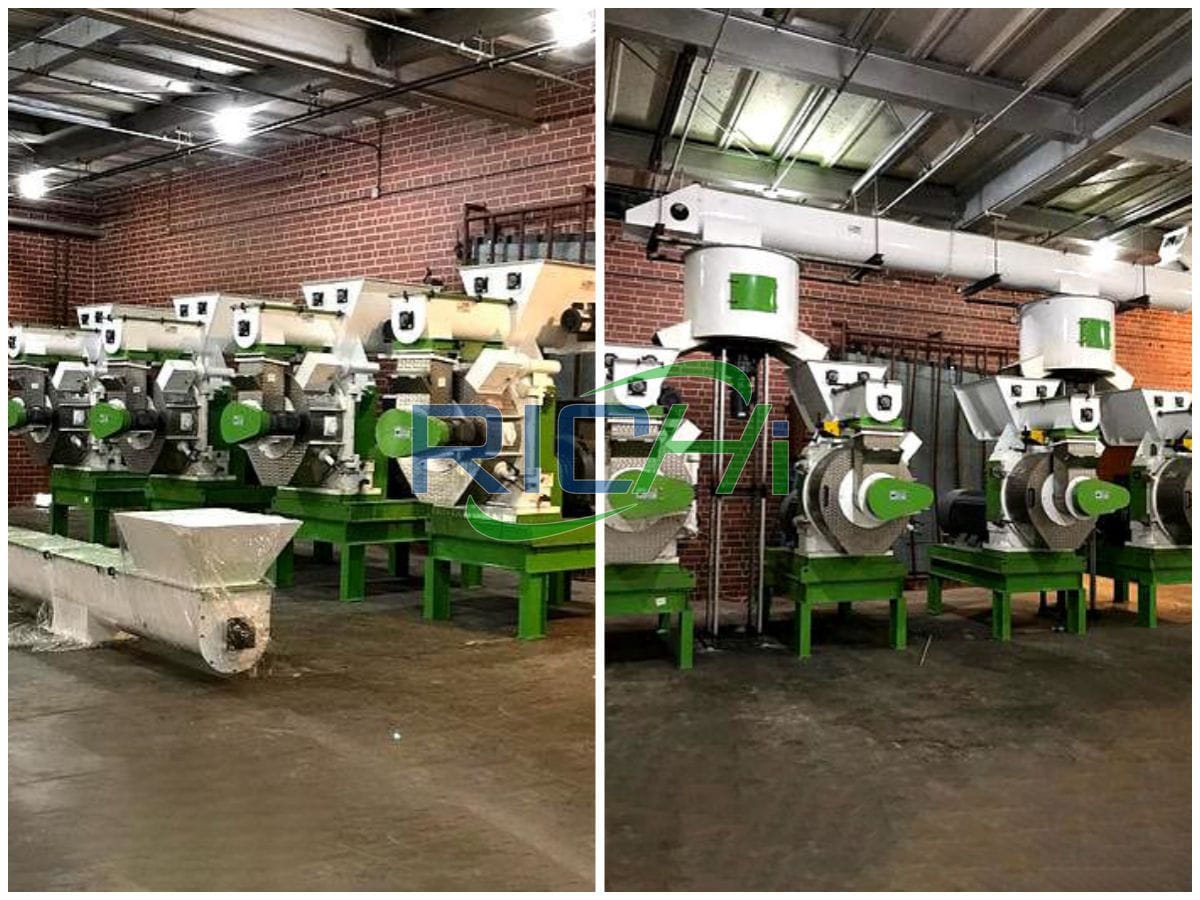
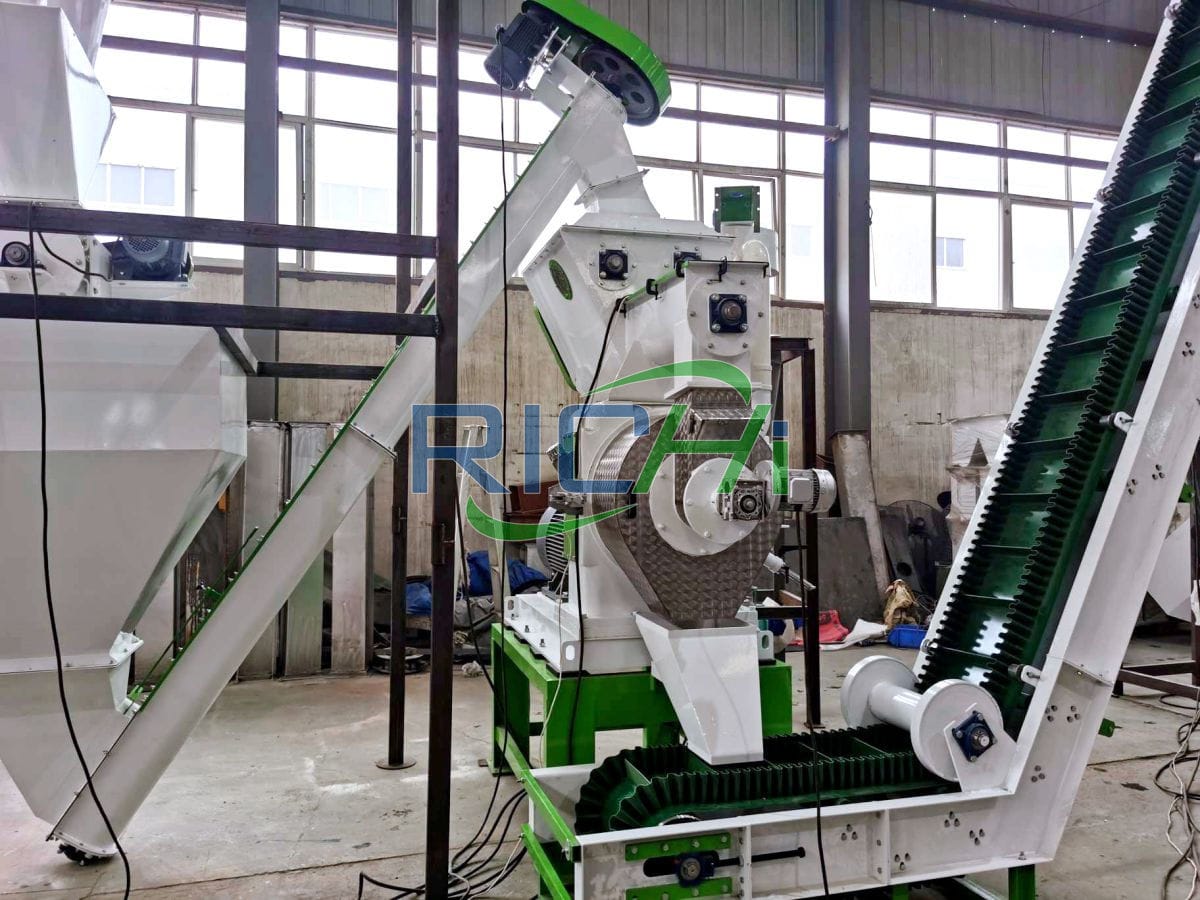
The biomass pellets making machine molding temperature has a very significant effect on the quality of pellet fuel. The research on the fracture surface of pellet fuel found that there was only a weak adhesion between pellet fuels when the molding temperature was 20℃.
High temperature and low humidity are the most important factors for increasing the compressive strength and density of wood pellets.
Elevated temperatures are beneficial for reducing energy consumption in the biomass granulator pelletizing process and producing stronger pellet fuels. For example: the optimal molding process parameters of cotton stalk pellet fuel are: molding temperature 190℃, hot pressing pressure 32 MPa, molding time 3 min; the optimal molding process parameters of bamboo pellet fuel are: molding temperature 250℃, hot pressing pressure 32 MPa, molding time 3 min.
As a manufacturer focusing on the biomass pellet mill for sale, we will devote ourselves to the improvement of brand quality, methods, modern management and service, ensure the speed of service response, we believe reliable products and worry-free services support Richi Machinery to go further.
04 Storage Time
Pellet fuel quality is also affected by the storage time of the raw material, as extractives and moisture content are reduced during storage. Processed wood chips and wood chip extracts decreased much faster than wild-stored logs.
In addition, the factors that affect the biomass pellet mill compression molding include the type of raw materials, particle size, shape and size of the mold, etc. Different types of raw materials have very different compression molding properties.
The type of raw materials not only affects the quality of molding, such as density, strength, calorific value, etc., but also affects production efficiency and power consumption.
The particle size of the raw material affects the quality of the molding block, and also affects the production efficiency and power consumption. Generally speaking, the raw material with small particle size is easy to compress, and the raw material with large particle size is more difficult to compress.
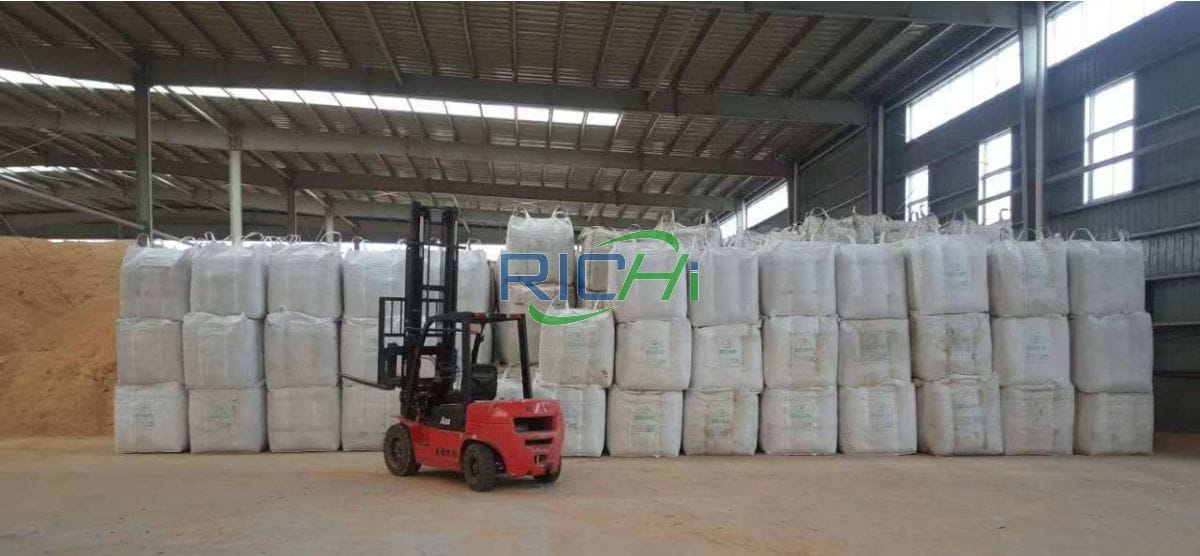
In addition to pellet strength and durability, specific energy consumption, biomass pellet mill production rate, maintenance and production costs should all be taken into consideration when investigating the optimal biomass pellet production line solution.
In terms of production operations, although the production process has been automated, training of highly skilled workers is also an important factor in improving pellet quality.
Technological innovation empowers the high-quality development of enterprises. From the chaser to the forerunner, Richi Machinery’s innovation power has been deeply rooted in all aspects of biomass pellet mill products, biomass pellet plant technologies, brands and changes, constantly improving the quality of enterprise development, enhancing the power of innovation, focusing on the industrial chain, and serving itself Development and accumulation of endless energy.
As a manufacturer focusing on the biomass wood pellet mill for sale, at the same time as a technologically innovative enterprise, Richi Machinery has a production base of the whole industry chain, which can carry out standardized and refined production of biomass pellet mills and supporting equipment.
How To Choose Raw Materials For Your Biomass Pellet Production?
In recent years, the application field of biomass pellets has been continuously extended, and more and more agricultural and forestry wastes have been used to make biomass pellets.
Biomass pellets refer to the addition of crushed corn, wheat, cotton, rice, wheat and oil crops and other agricultural and forestry wastes such as straw or sawdust, leaves into the pellet forming machine, and the crushed materials are moved relative to the mold by the rollers. The resulting friction is extruded. The prepared biomass pellet fuel can be used as a special stove for pellet fuel for cooking and heating, and can also be used as the main fuel for biomass industrial boilers and thermal power generation, which can replace coal.
01 Raw Materials For Your Biomass Pellet Production
- Woods: wood chips, wood shavings, waste sawdust from lumber mills, scraps from lumber mills, scraps of construction boards, garden pruning, forest logs and other miscellaneous wood.
- Bamboo scraps: Bamboo craft waste, such as chopsticks, toothpick factory and other wastes.
- Straw grass: cotton corn stalk, soybean stalk, rape flower stalk, wheat stalk, rice stalk, cassava stalk, bagasse, tobacco stalk, sea buckthorn stalk and other herbaceous plant stalks, energy grass, elephant grass, giant king grass, alfalfa grass (for cattle and sheep feed).
- Other categories: rice husks, peanut shells, bagasse, palm silk (fruit bunches), coconut shells, cow dung, pomace, etc.

Taking wood as an example:
- waste wood chips from board factories and furniture factories do not need to be crushed and dried, and can be used after screening;
- construction board waste needs to be crushed before use, and the pellets ash content is large;
- waste sawdust and leftovers from logging farms do not need to be crushed. But it needs to be dried, and the pellets ash content is low;
- garden pruning, forest logs, etc. may also need to be peeled.
According to different raw materials, the pressed pellets can be divided into biomass peanut husks pellets, rice husk pellets, miscellaneous wood pellets, pine wood pellets, bamboo pellets, efb pellets, sycamore pine pelletsand so on. The type of feedstock determines the calorific value of the produced biomass pellet fuel.
As a manufacturer focusing on the biomass pellet mill for sale, Richi Machinery firmly believes that product is the core of customer demand, and service is the value-added and extension of customer demand satisfaction. Having a RICHI biomass pellet mill also means having a complete After-sales service system care.
02 How To Choose Your Biomass Pellet Feedstock?
As an industry novice who wants to invest in the processing and sales of biomass pellets, how to choose raw materials for biomass pellets? The selection of biomass pellet feedstock is important in the initial stage, following the following points:
- The principle of reducing processing procedures is to use raw materials that can be used without crushing and drying, such as: waste wood chips and shavings in board factories and furniture factories.
- Choose coarse crushing and fine crushing that are easy to do, with large particle ash content, such as construction board waste, block board waste, etc.
- The ones that need to be dried do not need to be roughly crushed, they must be dried, and the particle ash content is low, such as logging farms, waste sawdust (with a certain moisture content), etc.
- The final choice is to consider coarse crushing, fine crushing, drying, and possibly peeling, if there is no problem with cost accounting and market sales, such as: garden pruning, forest logs and other raw materials that need to be processed.
As a manufacturer focusing on the biomass pellet mill for sale, Richi Machinery insists on summarizing and summarizing the details of pellet equipment manufacturing process, product improvement, on-site process layout, etc., digging deep into customer needs in multiple forms, and always taking technological innovation as the main driver We strive to do a good job in products and services, and continuously improve our production capacity and market influence.
03 Subsequent Supply For Your Biomass Pellet Production
The stable supply of biomass pellet raw materials is very important, and the stabilizing factors include stable quality, stable price and stable quantity of raw materials. The choice of raw materials still has to be determined according to the actual local conditions. Different regions have different local raw materials.
For example, some regions have more trees and straws, and some regions generally use sawdust or scraps from furniture factories. In postage areas, there are more rice husks, bamboo chips and wood chips. If the local raw material resources are abundant and the price is relatively low, the supply of raw materials will not be cut off.
In the later stage, many biomass pellet factories will also adopt the mode of contracting some furniture factory wastes. The transportation of biomass pellet production line raw materials is generally recommended to be around 30-50 kilometers.
The industrial market is still shrouded in the shadow of low-level operation. The cold winter of the market makes Richi Machinery confirm the correctness of the strategic development direction of “returning to the original intention, focusing on quality” and “full-service system”. The market cannot tolerate any falsehood.
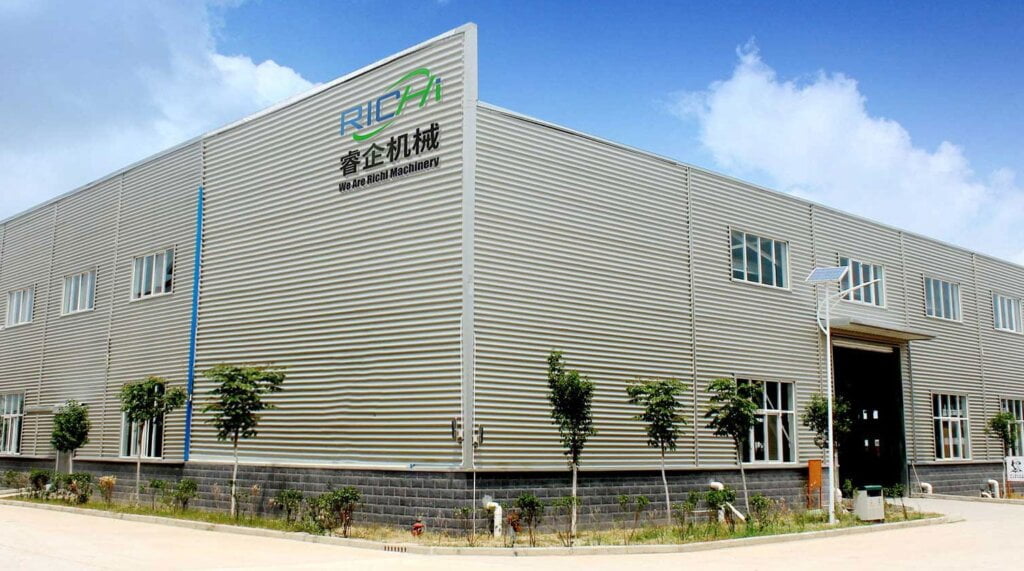

Customer experience is the touchstone. Richi Machinery has benefited a lot from winning the market with connotative products and high-quality services. Richi Machinery specialize in biomass pellet mill for sale, our biomass pellet mill is carefully designed for customers according to the actual requirements.
In the face of more rational customers and markets in the future, and in the face of real procurement needs, to carry out valuable in-depth discussions, RICHI will always use high-quality biomass pellet mills to provide higher quality and higher standards for the global biomass pellet processing. experience.
Tips For Using Biomass Pellet Machine
01
The Larger The Unit Density Of The Crushed Raw Materials, The Better
The higher the unit density of the crushed raw material, the better the self-fluidity and the higher the granulation output. Crop straw is best to be crushed into granules with a biomass grinding machine; the pulverized raw materials that are pulverized and processed with a kneading machine have many filaments, which are easy to be overhead, have poor feeding performance, and low granulation yield.
02
The Moisture Content Of The Material Should Be Appropriate
If the moisture content of the material is too high or too low, it will affect the yield and quality of biomass pelletizer granulation. If the moisture content of the material is too high, more than 20%, it will be difficult to adjust and temper, which will easily cause the material to slip between the inner wall of the ring die and the pressing roller, resulting in blockage of the ring die hole, no pellets can be pressed, and the biomass granulator output will be reduced.
It is also easy to cause the pellets to become fat, low density, poor finish, and reduced quality. If the moisture content is lower than 14%, the friction between the material and the biomass pellet mill will be severe, the powder will be discharged, and the biomass pellet press granulation output will be reduced. It is generally required that the moisture content of the material before conditioning should be 15% to 18%.
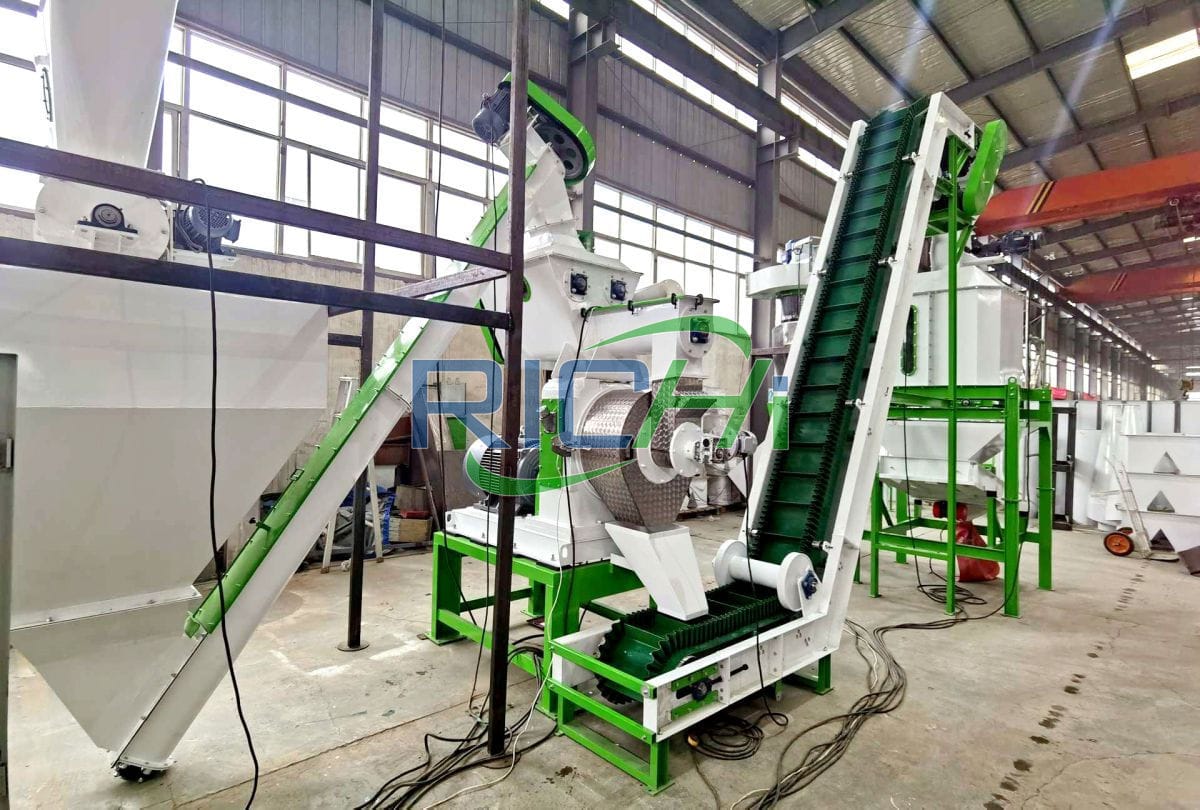
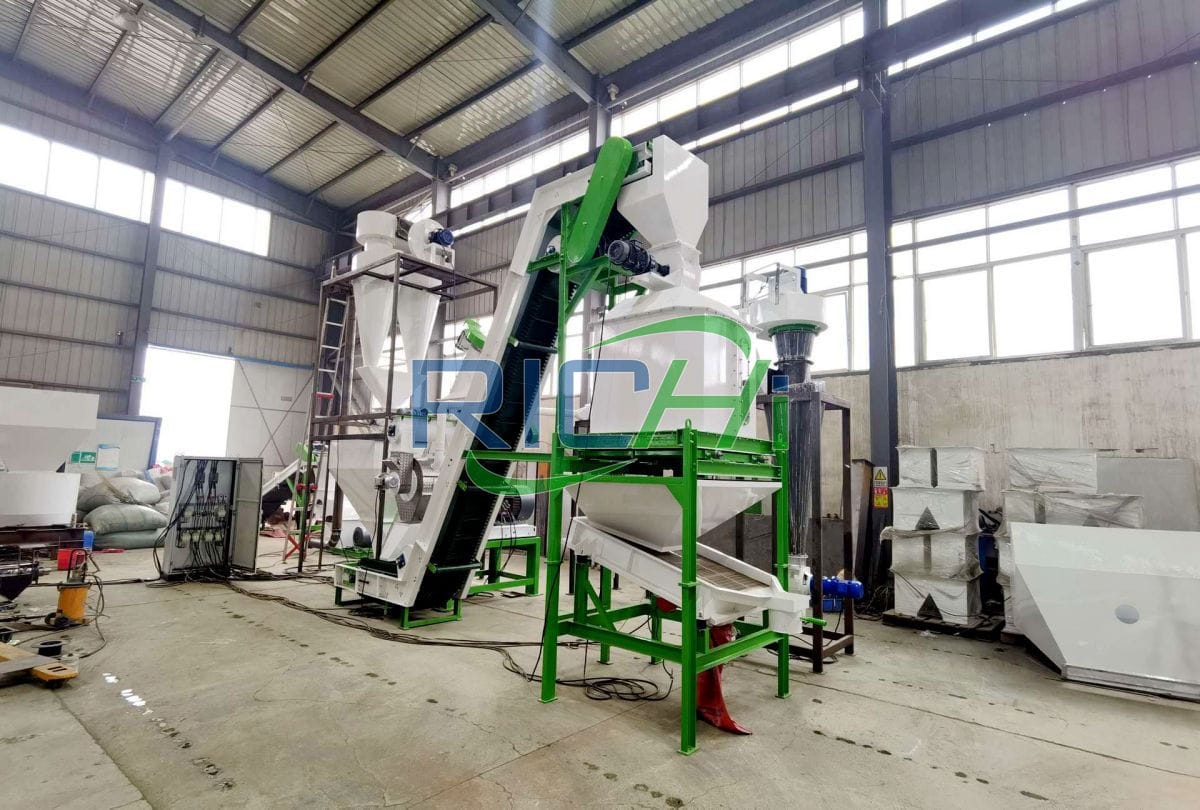
Richi Machinery,a professional biomass pellet mill manufacturer, has been focusing on biomass pellet mill for sale for 25+ years. High standards and strict requirements have always been the insistence of RICHI. We provide product and technical consultation for global customers, and design production line configuration solutions for free.
